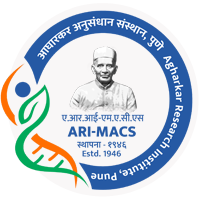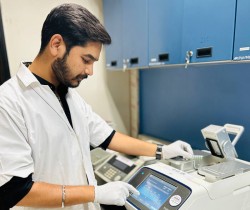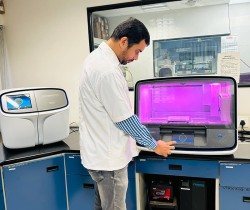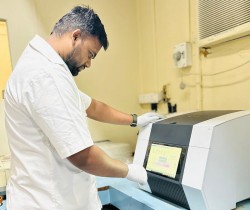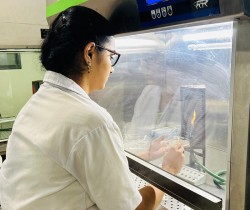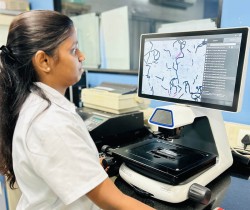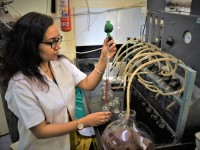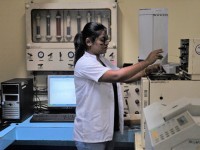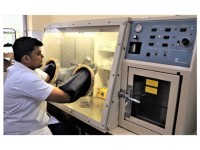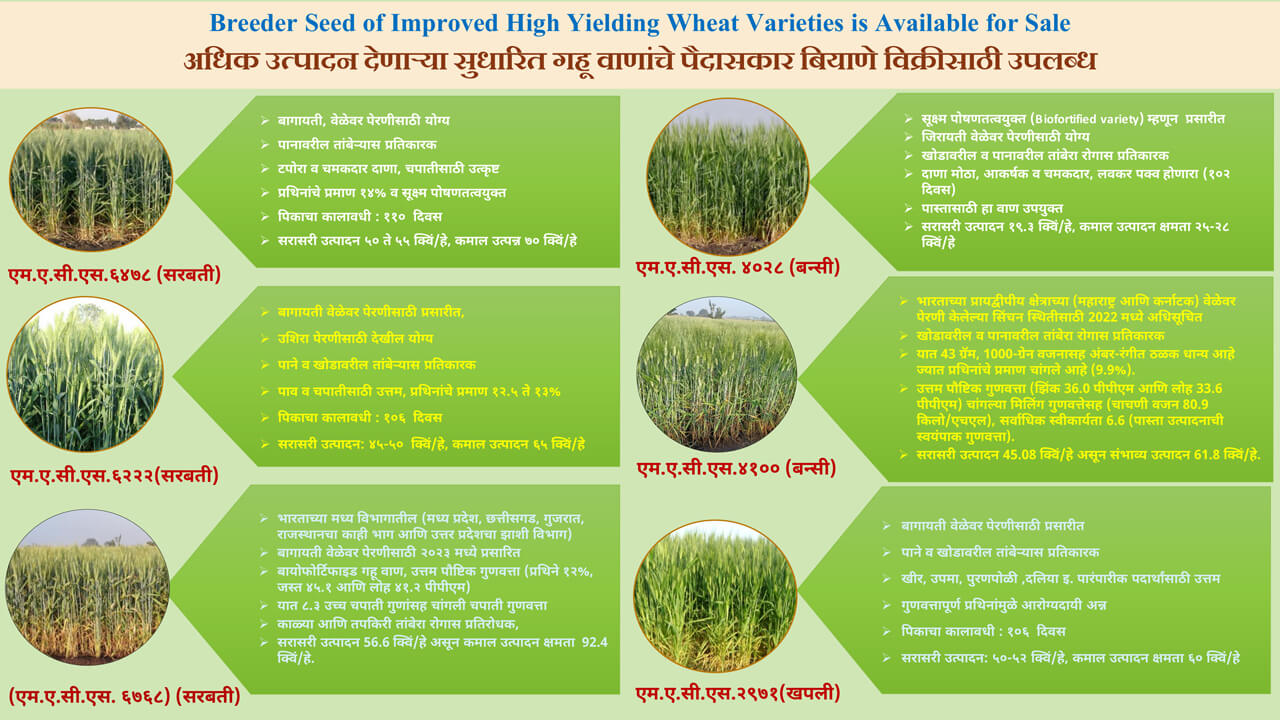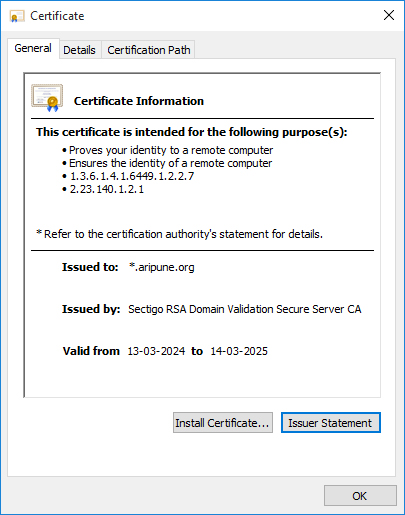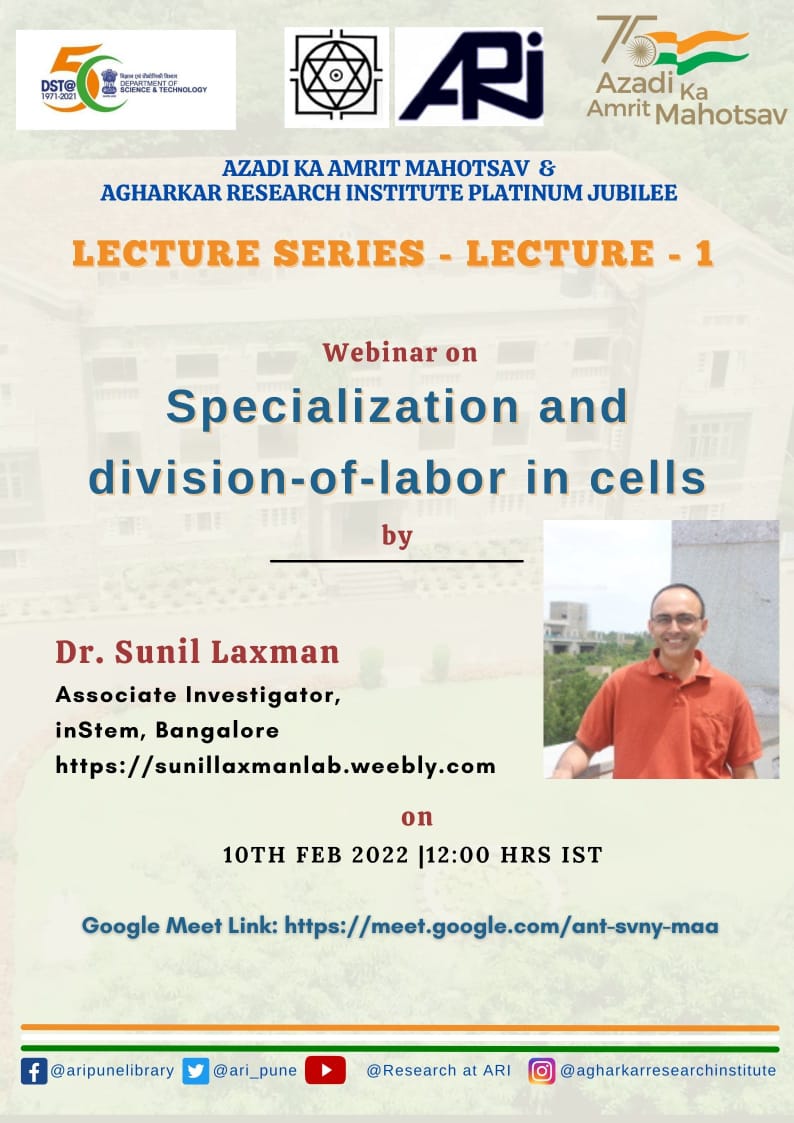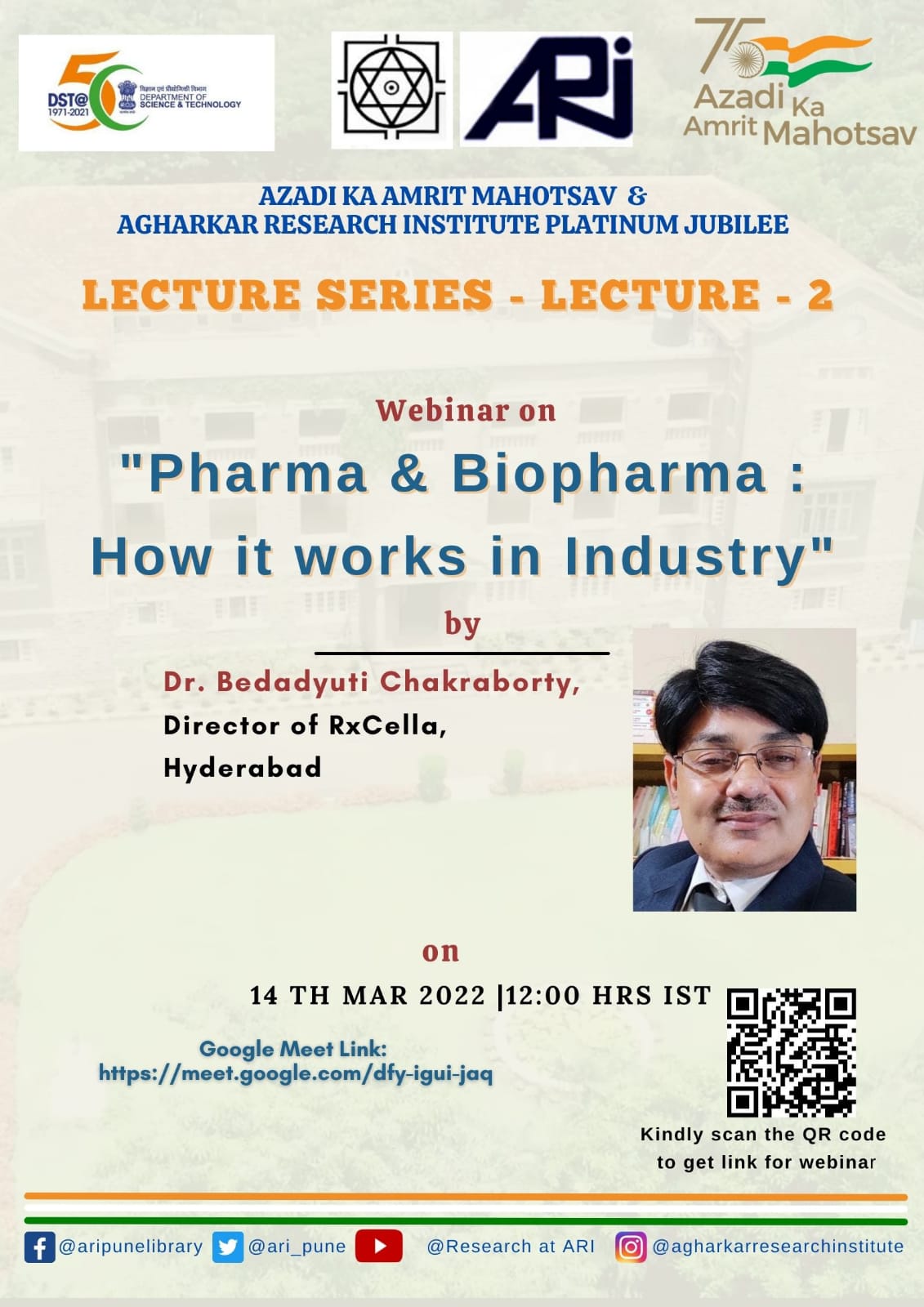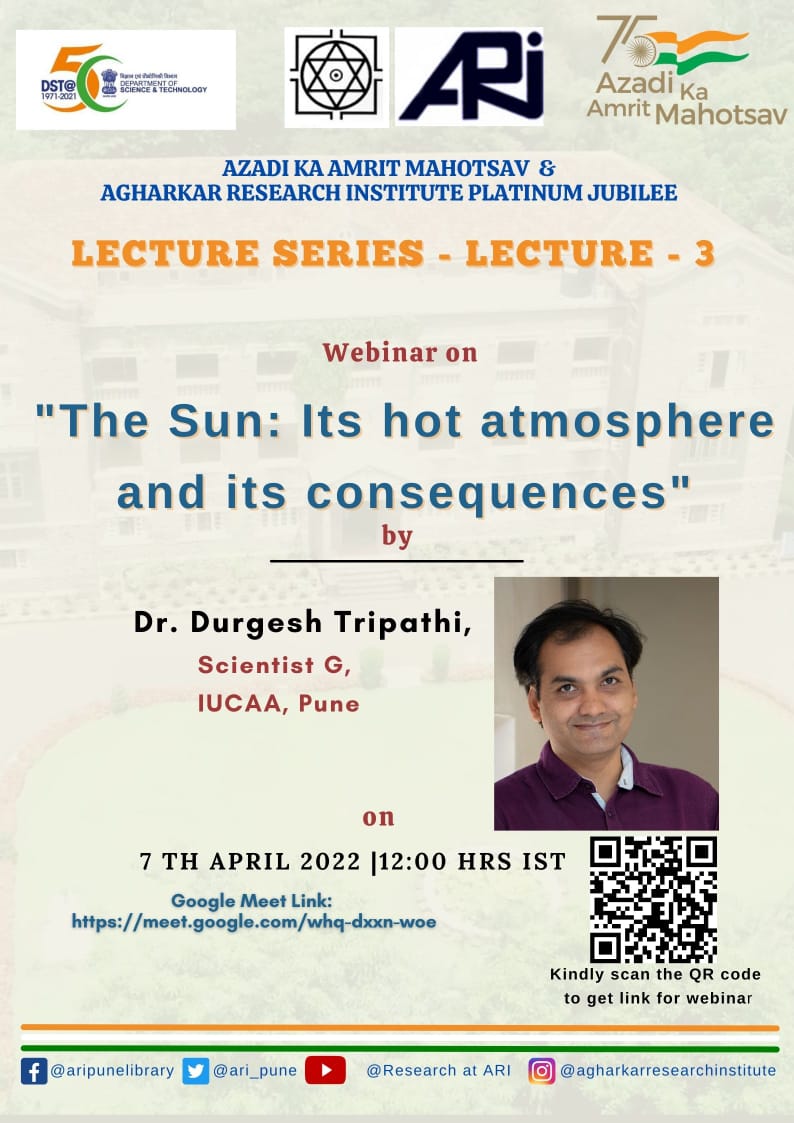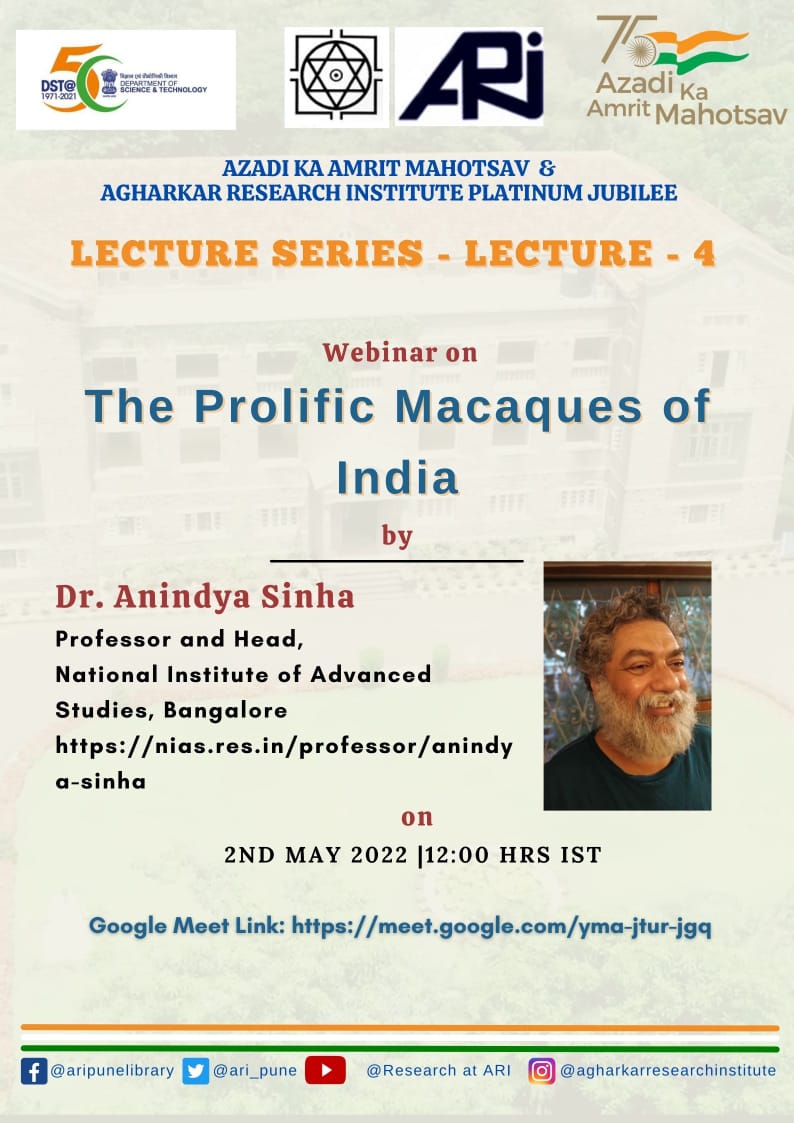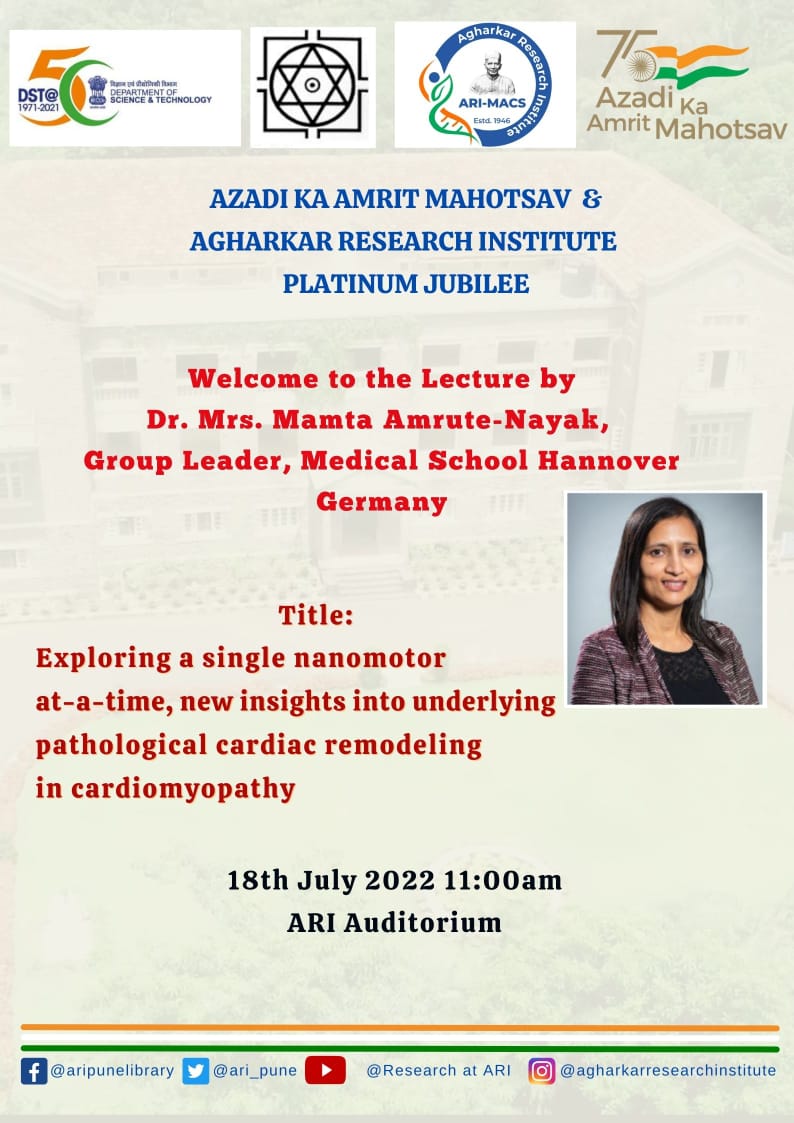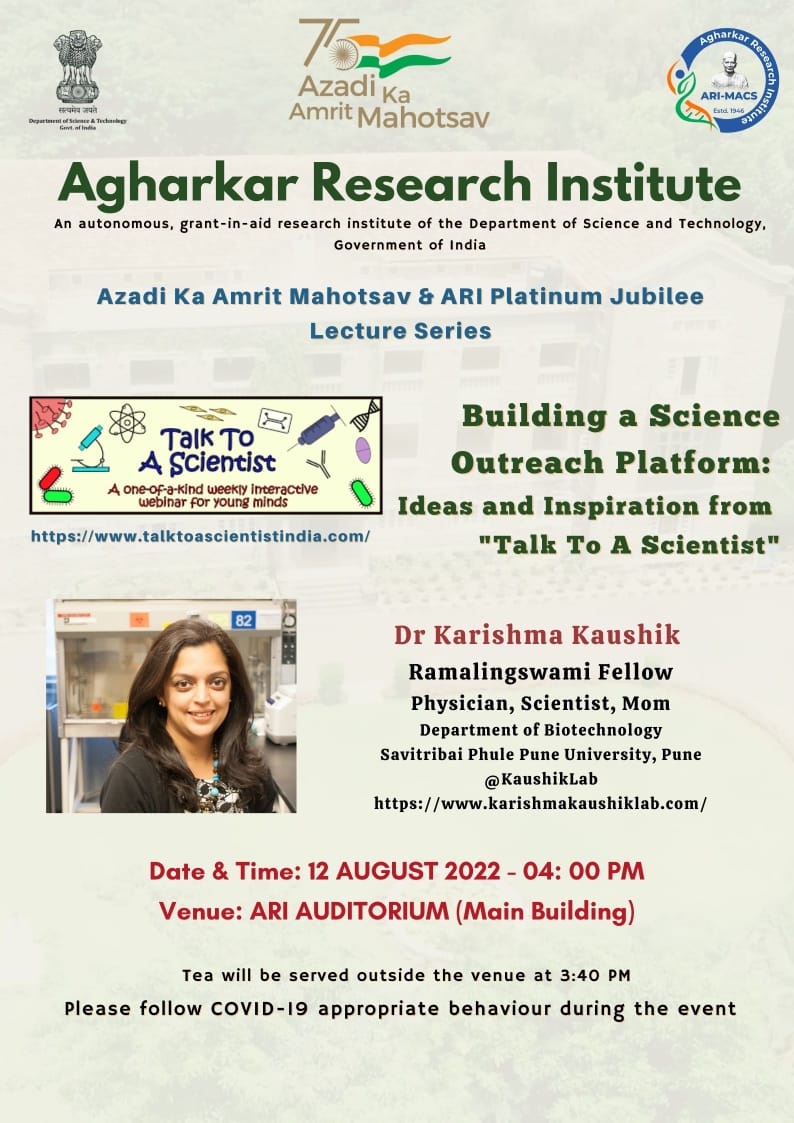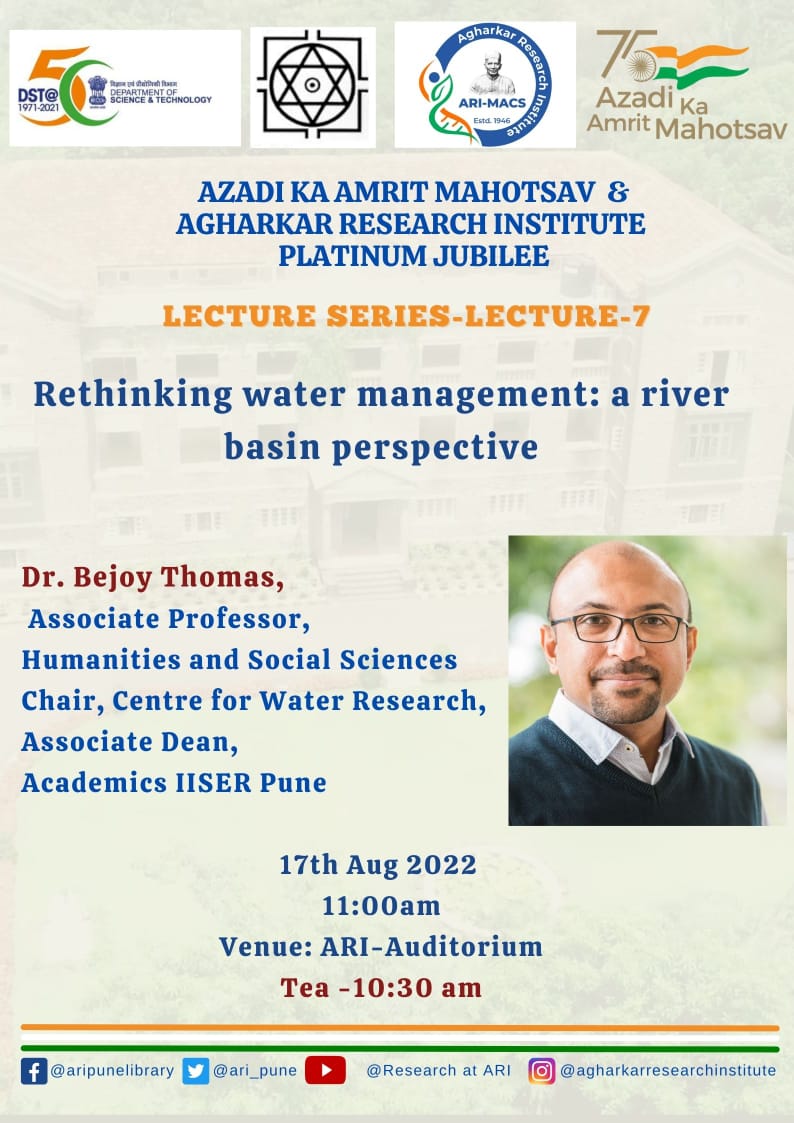Welcome To Bioenergy Group
Bioenergy group has emanated from the erstwhile Microbiology group of Microbial Sciences Division
Research Activities
Anaerobic cellulolytic and methanogenic organisms from gobar gas plants were reported for the first time in India by the microbiology group of the Agharkar Research Institute. A specialized culture collection of anaerobic organisms was also established. The current research activities of the Bioenergy group are focused on “exploring and exploiting microorganisms for sustainable energy”. Under this theme, specific research activities are as follows:
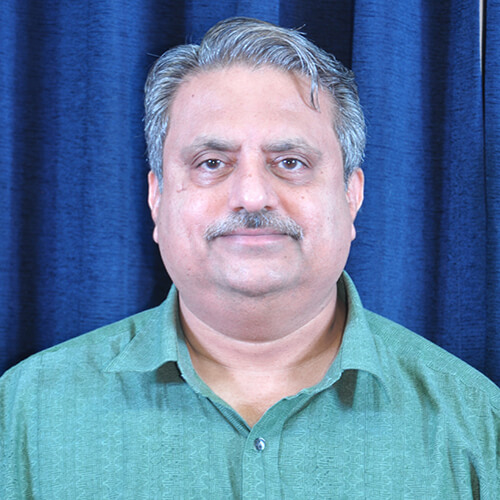
Google Scholar / Social Media
Name : Dr. Prashant Dhakephalkar
Designation : Director
Brief Background :
Dr. Prashant Dhakephalkar is a distinguished scientist and currently serves as the Director of Agharkar Research Institute (ARI). With a strong educational background and extensive scientific experience, he has made significant contributions to the field of microbiology and environmental research. His scientific journey began with his early academic achievements, culminating in a Ph.D. in Microbiology. In 1998 , he joined University of Virginia, Charlottesville, USA as a Postdoctoral researcher. He has over 30 years of experience in the field of microbiology and environmental research. His research focuses on investigating the microbial diversity associated with extreme, pristine, and other unique habitats for taxonomic novelty and biotechnological potential. Furthermore, his expertise in microbial cultures and consortiums has led to the development of cutting-edge technologies in the fields of bioenergy, petroleum biotechnology, bioremediation, and the production of valuable enzymes and biomolecules. He is widely recognized for his expertise in the field and has mentored 15 Ph.D. and several M.Sc. students. With a remarkable track record, he has authored over 98 papers in esteemed journals, solidifying his reputation as a prolific researcher in the field. He has also collaborated with several industrial partners such as ONGC, HTBL, KPIT, etc. to develop innovative technologies that address pressing environmental and energy challenges.
Dr. Prashant Dhakephalkar’s dedication to advancing scientific knowledge, coupled with his practical contributions through industrial collaborations, has established him as a leading figure in the field of microbiology and environmental research. Under his directorship, Agharkar Research Institute continues to thrive as a centre of excellence, fostering cutting-edge research and technological innovations.
Contact Details :
+91-20-25325096 (Office)
+91 9552709158 (Fax)
Educational Qualification
- B.Sc. Microbiology, SPPU
- M.Sc. Microbiology, SPPU
- Ph.D. Microbiology, SPPU
Research Interests
My major research interest is in investigating the microbial diversity associated with extreme, pristine and other habitats for taxonomic novelty and industrial applications (especially Bioenergy, Petroleum Biotechnology and Bioremediation). My group works on collecting samples from a variety of extreme and pristine habitats including (but not limited to) volcanic mud, deep subsurface high temperature oil reservoirs, submarine methane hydrate sediments, high altitude lake sediments, etc. We document the bacterial and archaeal diversity associated with such environments using metagenomics.. Extremophiles such as thermophiles, halophiles, barotolerant and other microorganisms are isolated and novel taxa are documented by adopting the polyphasic identification approach. Microbial cultures, in isolation or as consortium, are used to develop technologies in the field of bioenergy, petroleum biotechnology, bioremediation or production of valuable enzymes/ biomolecules. Microbial metabolism underlying such industrial application is investigated using whole genome, transcriptome and proteome analysis.
Technologies developed/ transferred with industrial sponsorship:
- Bio-scavenger: a microbial formulation that facilitates rapid degradation of human excreta, and also inhibits associated enteropathogens and malodor (sponsored by Vikalpa Technologies, Pune).
- Petroleum Biotechnology
- Microbial Enhanced Oil Recovery from high temperature (>90 °C) depleting oil reservoirs (sponsored by IRS-ONGC, Ahmedabad)
- Bacteriophage mediated biocontrol of sulphate reducing bacteria and souring of oil wells (sponsored by ONGC Energy Centre, Delhi)
- Treatment of produced water to make it suitable for reinjection in oil wells (sponsored by IRS-ONGC, Ahmedabad)
- Bioremediation of terrestrial oil spills (sponsored by IRS-ONGC, Ahmedabad)
Bioenergy
- Biomethanation of rice straw without thermochemical pretreatment (Sponsored by DSM, India)
- Biomethanation of lignite, the low-grade coal (sponsored by sponsored by ONGC Energy Centre, Delhi)
- Biohydrogen production from agricultural or industrial waste (KPIT Technologies Ltd.)
Environment friendly and energy efficient Microbial processes for the production industrially valuable products
- Microbial process for the production of optically pure amino acids (sponsored by Sci Molecules India Pvt. Ltd.)
- Probiotics as oral adjuncts for improved health and productivity of poultry (Sponsored by Hi Tech BioLaboratories, Pune)
- Value addition of commercial probiotics through characterization of health promoting and disease preventing properties of probiotics (sponsored by HiTech Bio Sciences India Ltd.)
Publications
- Lanjekar, V. B., Hivarkar, S. S., Vasudevan, G., Joshi, A., Dhakephalkar, P. K., & Dagar, S. S. (2023). Actinomyces ruminis sp. nov., an obligately anaerobic bacterium isolated from the rumen of cattle. Archives of Microbiology, 205(1), 9.
- Sengupta, K., Hivarkar, S. S., Palevich, N., Chaudhary, P. P., Dhakephalkar, P. K., & Dagar, S. S. (2022). Genomic architecture of three newly isolated unclassified Butyrivibrio species elucidate their potential role in the rumen ecosystem. Genomics, 114(2), 110281.
- Avchar, R., Lanjekar, V., Dhakephalkar, P. K., Dagar, S. S., & Baghela, A. (2022). Compost as an untapped niche for thermotolerant yeasts capable of high‐temperature ethanol production. Letters in Applied Microbiology, 74(1), 109-121.
- Kapse, N. G., Paliwal, V., Dagar, S. S., Rana, D. P., & Dhakephalkar, P. K. (2022). Genomics and simulated laboratory studies reveal Thermococcus sp. 101C5 as a novel hyperthermophilic archaeon possessing a specialized metabolic arsenal for enhanced oil recovery. Antonie van Leeuwenhoek, 1-13.
- Mehta, P., Deshmukh, K., Dagar, S. S., Dhakephalkar, P. K., & Lanjekar, V. B. (2021). Genome sequencing and analysis of a psychrotrophic methanogen Methanosarcina sp. nov. MSH10X1 cultured from methane hydrate deposits of Krishna Godavari Basin of India. Marine Genomics, 59, 100864.
- Avchar, R., Lanjekar, V., Kshirsagar, P., Dhakephalkar, P. K., Dagar, S. S., & Baghela, A. (2021). Buffalo rumen harbours diverse thermotolerant yeasts capable of producing second-generation bioethanol from lignocellulosic biomass. Renewable Energy, 173, 795-807.
- Singh, P., Kapse, N., Gowdaman, V., Tsuji, M., Singh, S. M., & Dhakephalkar, P. K. (2021). Comparative Genomic Analysis of Arctic Permafrost Bacterium Nesterenkonia sp. PF2B19 to Gain Insights into Its Cold Adaptation Tactic and Diverse Biotechnological Potential. Sustainability, 13(8), 4590.
- Kanekar, P. P., Kulkarni, S. O., Dhakephalkar, P. K., Saxena, N., & Pathan, H. M. (2021). Bacteriorhodopsin producing halophilic archaea isolated from solar salt pan saline environment for conversion of light energy into electrical energy. ES Energy & Environment, 13, 57-64.
- Devi, A. B., Rahigude, A. B., Parab, P. B., Engineer, A. S., Dhakephalkar, P. K., & Apte, K. G. (2021). A study to evaluate the hepatoprotective activity of prebiotics, probiotics, and synbiotic in CCl4 induced hepatotoxicity in rats. Journal of Applied Pharmaceutical Science, 11(3), 141-153.
- Nagkirti, P. D., Engineer, A. S., & Dhakephalkar, P. K. (2021). Xylanimonas oleitrophica sp. nov., a novel petroleum hydrocarbon degrading bacterium isolated from an Indian oil reservoir. Antonie van Leeuwenhoek, 114, 129-136.
- Tiwari, S., Avchar, R., Arora, R., Lanjekar, V., Dhakephalkar, P. K., Dagar, S. S., & Baghela, A. (2020). Xylanolytic and ethanologenic potential of gut associated yeasts from different species of termites from India. Mycobiology, 48(6), 501-511.
- Shetty, D., Joshi, A., Dagar, S. S., Kshirsagar, P., &Dhakephalkar, P. K. (2020). Bioaugmentation of anaerobic fungus Orpinomycesjoyonii boosts sustainable biomethanation of rice straw without pretreatment. Biomass and Bioenergy, 138, 105546.
- Hanafy, R.A., Lanjekar, V.B., Dhakephalkar, P.K., Callaghan, T.M., Dagar, S.S., Griffith, G.W., Elshahed M.S., Youssef, N.H. (2020): Seven new Neocallimastigomycota genera from wild, zoo-housed, and domesticated herbivores greatly expand the taxonomic diversity of the phylum, Mycologia, DOI: 10.1080/00275514.2019.1696619
- Engineer, A.S., Yadav, K.K., R. Kshirsagar, P.R., Dhakephalkar, P.K. (2020) A novel, enantioselective, thermostable recombinant hydantoinase to aid the synthesis of industrially valuable non-proteinogenic amino acids. Enzyme and Microbial Technology. 138: https://doi.org/10.1016/j.enzmictec.2020.109554
- Arora, P., Kshirsagar, P.R., Rana, D.P., Dhakephalkar, P.K. (2019) Hyperthermophilic Clostridium sp. N-4 produced a glycoprotein biosurfactant that enhanced recovery of residual oil at 96° C in lab studies. Colloids and Surfaces B: Biointerfaces. https://doi.org/10.1016/j.colsurfb.2019.110372
- Tapadia-Maheshwari, S.N., Pore, S.D., Engineer, A.S., Shetty, D.S., Dagar, S.S., Dhakephalkar, P.K. (2019) Illustration of the microbial community selected by optimized process and nutritional parameters resulting in enhanced biomethanation of rice straw without thermo-chemical pretreatment. Bioresource Technology. 289: 121639. https://doi.org/10.1016/j.biortech.2019.121639
- Rahalkar, M. C., Khatri, K., Pandit, P. S., &Dhakephalkar, P. K. (2019). A putative novel Methylobacter member (KRF1) from the globally important Methylobacter clade 2: cultivation and salient draft genome features. Antonie Van Leeuwenhoek, 112(9), 1399-1408.
- Pore, S.D., Engineer, A.S., Dagar, S.S., Dhakephalkar, P.K. (2019) Meta-omics based analyses of microbiome involved in biomethanation of rice straw in a thermophilic anaerobic bioreactor under optimized conditions. Bioresour Technol. 279: 25-33. IF 5.807
- Joshi, A., Lanjekar, V. B., Dhakephalkar, P. K., Callaghan, T. M., Griffith, G. W., Dagar, S. S. (2018). Liebetanzomycespolymorphus gen. et sp. nov., a new anaerobic fungus (Neocallimastigomycota) isolated from the rumen of a goat. MycoKeys. 40: 89 – 110. IF 3.269
- Joshi, A., Lanjekar, V., Dhakephalkar, P. K., Dagar, S. S. (2018). Cultivation of multiple genera of hydrogenotrophic methanogens from different environmental niches. Anaerobe. 50: 64-68. IF 2.742
- Kapse, N.G., Engineer, A.S., Gowdaman, V., Wagh, S., Dhakephalkar, P.K. (2018). Functional annotation of the genome unravels probiotic potential of Bacillus coagulans HS243. Genomics. https://doi.org/10.1016/j.ygeno.2018.05.022. IF 2.910
- Patwardhan, R. B., Dhakephalkar, P. K., Chopade, B. A., Dhavale, D. D., Bhonde, R. R. (2018). Purification and characterization of an active principle, lawsone, responsible for the plasmid curing activity of Plumbago zeylanica root extracts. Front Microbiol. 9: 1-10. IF 4.019
- Rahalkar, M.C., Patil, S., Dhakephalkar, P.K., Bahulikar, R.A. (2018). Cultivated methanotrophs associated with rhizospheres of traditional rice landraces from Western India belong to Methylocaldum and Methylocystis. 3 Biotech. 8: 281. IF 1.497
- Singh, T., Kshirsagar, P. R., Das, A., Yadav, K., Mallik, S., Mascarenhas‐Pereira, M. B. L., Thomas, T.A., Shivaramu M. S., LokaBharati, P.A., Khadge, N.H., Nath, B.N., Dhakephalkar, P. K., Iyer, S. D., Ray, D., Valsangkar, A.B., Garg, A., Prakash Babu, C., Waghole, R.J., Waghmare, S. S., Rajwade, J.M., Paknikar, K.M. (2018). Implications of microbial thiosulfate utilization in red clay sediments of the Central Indian Basin‐The Martian Analogy. Geochemistry, Geophysics, Geosystems. https://doi.org/10.1029/2018GC007640. IF 2.98
- Joshi, A., Vasudevan, G., Engineer, A., Pore, S., Hivarkar, S. S., Lanjekar, V. B., Dhakephalkar, P. K., Dagar, S. S. (2018). Genomic Analysis of Actinomyces sp. Strain CtC72, a Novel Fibrolytic Anaerobic Bacterium Isolated from Cattle Rumen. Microbiol. Biotechnol. Lett. 46: 59–67
- Das, A., Singh, T., LokaBharathi, P. A., Dhakephalkar, P. K., Mallik, S., Kshirsagar, P. R., & Kaur, P. (2017). Astrobiological implications of dim light phototrophy in deep-sea red clays. Life Sci. Space Res, 12, 39-50.
- Joshi, V., Shah, N., Wakte, P., Dhakephalkar, P., Dhakephalkar, A., Khobragade, R., Naphade, B., Shaikh, S., Deshmukh, A., Adhapure, N. (2017). Comparative bioleaching of metals from pulverized and non-pulverized PCBs of cell phone charger: advantages of non-pulverized PCBs. Environ Sci Pollut Res. 24: 28277-28286. IF 2.8
- Kanekar, P. P., Kulkarni, S. O., Dhakephalkar, P. K., Kulkarni, K. G., Saxena, N. (2017). Isolation of a halophilic, bacteriorhodopsin-producing archaeon, Haloferaxlarsenii RG3D.1 from the rocky beach of Malvan, West Coast of India. Geomicrobiol J. 34: 242-248. IF 1.433
- Shetty, D. J., Kshirsagar, P., Tapadia-Maheshwari, S., Lanjekar, V., Singh, S. K., Dhakephalkar, P. K. (2017). Alkali pretreatment at ambient temperature: A promising method to enhance biomethanation of rice straw. Bioresour Technol. 226: 80-88. IF 5.807
- Parmar, K. M., Gaikwad, S. L., Dhakephalkar, P. K., Kothari, R., Singh, R. P. (2017). Intriguing interaction of bacteriophage-host association: an understanding in the era of omics. Front Microbiol. 8: 559.
- Singh, K., Gedam, P. S., Raut, A. N., Dhamole, P. B., Dhakephalkar, P. K., Ranade, D. R. (2017). Enhanced n-butanol production by Clostridium beijerinckii MCMB 581 in presence of selected surfactant. 3 Biotech. 7: 161. IF 1.497
- Dangi, R., Oulkar, D., Dhakephalkar, P., Singh, S. K., Banerjee, K., Naik, D., & Dangi, R. (2016). Antimicrobial Activity of Some Trigonella Species. Int. J. Phytomedicine, 8, 80-94.
- Pandit, P.S., Ranade, D.R., Dhakephalkar, P.K., Rahalkar, M.C. (2016). A pmoA-based study reveals dominance of yet uncultured Type I methanotrophs in rhizospheres of an organically fertilized rice field in India. 3 Biotech. 6: 1-6. IF 1.497
- Antony, R., Sanyal, A., Kapse, N., Dhakephalkar, P. K., Thamban, M., Nair, S. (2016). Microbial communities associated with Antarctic snow pack and their biogeochemical implications. Microbiol Res. 192: 192-202. IF 2.777
- Kamalaskar, L., Kapse, N., Pore, S., Dhakephalkar, A. P., Ranade, D. R., Dhakephalkar, P. K. (2016). Genome sequence and gene expression studies reveal novel hydrogenases mediated hydrogen production by Clostridium biohydrogenum sp. nov., MCM B-509T. Int J Hydrogen Energ. 41: 11990-11999. IF 4.229
- Rahalkar, M. C., Pandit, P. S., Dhakephalkar, P. K., Pore, S., Arora, P., Kapse, N. (2016). Genome characteristics of a novel type I methanotroph (Sn10-6) isolated from a flooded Indian rice field. Microb Ecol. 71: 519-523. IF 3.614
- Pandit, P. S., Rahalkar, M. C., Dhakephalkar, P. K., Ranade, D. R., Pore, S., Arora, P., Kapse, N. (2016). Deciphering community structure of methanotrophs dwelling in rice rhizospheres of an Indian rice field using cultivation and cultivation-independent approaches. Microb Ecol. 71: 634-644. IF 3.614
- Pore, S. D., Shetty, D., Arora, P., Maheshwari, S., Dhakephalkar, P. K. (2016). Metagenome changes in the biogas producing community during anaerobic digestion of rice straw. Bioresour Technol. 213: 50-53. IF 5.807
- Saxena, N., Pore, S., Arora, P., Kapse, N., Engineer, A., Ranade, D. R., Dhakephalkar, P. K. (2015). Cultivable bacterial flora of Indian oil reservoir: isolation, identification and characterization of the biotechnological potential. Biologia. 70: 1-10. IF 0.696
- Rahalkar, M. C., Pore, S., Arora, P., Pandit, P., Kapse, N., Bahulikar, R., Schink, B., Dhakephalkar, P. K. (2015). Draft genome of Elsteralitoralis, a freshwater epilithic biofilm associated bacterium from littoral zone of Lake Constance. Mar Genom. 24: 223-224. IF 1.937
- Honkalas, V. S., Dabir, A. P., Arora, P., Ranade, D. R., Dhakephalkar, P. K. (2015). Draft genome sequence of Clostridium sulfidigenes 113A isolated from sub-seafloor sediments associated with methane hydrate deposits. Mar Genom. 22: 23-24. IF 1.937
- Honkalas, V. S., Dabir, A. P., Arora, P., Ranade, D. R., Dhakephalkar, P. K. (2015). Draft genome sequence of Clostridium celerecrescens 152B isolated from sub-seafloor methane hydrate deposits. Mar Genom. 21: 23-24. IF 1.937
- Singh, P., Kapse, N., Arora, P., Singh, S. M., Dhakephalkar, P. K. (2015). Draft genome of Cryobacterium sp. MLB-32, an obligate psychrophile from glacier cryoconite holes of high Arctic. Mar Genom. 21: 25-26. IF 1.937
- Patwardhan, R. B., Dhakephalkar, P. K., & Chopade, B. A. (2015). Antibacterial and plasmid curing activities of root extracts of Plumbago zeylanica. Int. J. Herb. Med, 2(1), 13-25.
- Palande, V., Meora, R., Sonavale, R. M., Makashir, M., Modak, M. S., Kapse, N., & Kunchiraman, B. N. (2015). Inhibition of pathogenic strains of Candida albicans and non-albicans by Bacillus species isolated from traditional Indian fermented food preparations. Int. J. Curr. Microbiol. App. Sci, 4(3), 691-699.
- Adhapure, N. N., Dhakephalkar, P. K., Dhakephalkar, A. P., Tembhurkar, V. R., Rajgure, A. V., & Deshmukh, A. M. (2014). Use of large pieces of printed circuit boards for bioleaching to avoid ‘precipitate contamination problem’and to simplify overall metal recovery. MethodsX, 1, 181-186.
- Kalmath, B. S., Prabhuraj, A., Dhakephalkar, P. K., Supreet, H., & Giraddi, R. S. (2014). Characterization of Lysinibacillus sphaericus C3-41 strain isolated from northern Karnataka, India that is toxic to mosquito larvae. Journal of Biological Control, 28(1), 24-30.
- Dabir, A., Honkalas, V., Arora, P., Pore, S., Ranade, D. R., Dhakephalkar, P. K. (2014). Draft genome sequence of Methanoculleus sp. MH98A, a novel methanogen isolated from sub-seafloor methane hydrate deposits in Krishna Godavari basin. Mar Genom. 18: 139-140. IF 1.937
- Arora, P., Ranade, D. R., Dhakephalkar, P. K. (2014). Development of a microbial process for the recovery of petroleum oil from depleted reservoirs at 91–96 °C. Bioresour Technol. 165: 274-278. IF 5.807
- Singh, P., Singh, S. M., Dhakephalkar, P. (2014). Diversity, cold active enzymes and adaptation strategies of bacteria inhabiting glacier cryoconite holes of High Arctic. Extremophiles. 18: 229-242. IF 2.00
- Polkade, A., Shede, P., Kanekar, P., Dhakephalkar, P., & Sarnaik, S. (2013). Designing and Evaluation of Skin Extract Agar for Isolation of Microflora from Raw Buffalo Hide. IIOAB Letters, 3(1).
- Engineer, A. S., Dhakephalkar, A. P., Gaikaiwari, R. P., Dhakephalkar, P. K. (2013). Process parameter optimization for hydantoinase-mediated synthesis of optically pure carbamoyl amino acids of industrial value using Pseudomonas aeruginosa resting cells. J Ind Microbiol Biot. 40: 1367-1372. IF 3.103
- Antony, R., Krishnan, K. P., Laluraj, C. M., Thamban, M., Dhakephalkar, P. K., Engineer, A. S., Shivaji, S. (2012). Diversity and physiology of culturable bacteria associated with a coastal Antarctic ice core. Microbiol Res. 167: 372-380. IF 2.777
- Purushe, S., Prakash, D., Nawani, N. N., Dhakephalkar, P., Kapadnis, B. (2012). Biocatalytic potential of an alkalophilic and thermophilic dextranase as a remedial measure for dextran removal during sugar manufacture. Bioresour Technol. 115: 2-7. IF 5.807
- Pour, N. K., Dusane, D. H., Dhakephalkar, P. K., Zamin, F. R., Zinjarde, S. S., Chopade, B. A. (2011). Biofilm formation by Acinetobacter baumannii strains isolated from urinary tract infection and urinary catheters. FEMS Immunol Med Mic. 62: 328-338. IF 2.554
- Rokhbakhsh-Zamin, F., Sachdev, D., Kazemi-Pour, N., Engineer, A., Pardesi, K. R., Zinjarde, S., Dhakephalkar, P.K., Chopade, B. A. (2011). Characterization of plant-growth-promoting traits of Acinetobacter species isolated from rhizosphere of Pennisetumglaucum. JMicrobiol Biotechnol., 21: 556-566. IF 1.65
- Satpute, M. G., Telang, N. V., Dhakephalkar, P. K., Niphadkar, K. B., Joshi, S. G. (2011). Isolation of Burkholderiacenocepacia J 2315 from non-cystic fibrosis pediatric patients in India. Am J Infect Control. 39: e21-e23. IF 1.929
- Kamalaskar, L. B., Dhakephalkar, P. K., Meher, K. K., Ranade, D. R. (2010). High biohydrogen yielding Clostridium sp. DMHC-10 isolated from sludge of distillery waste treatment plant. Int J Hydrogen Energ. 35: 10639-10644. IF 4.229
- Varsha, S., Sheetal, J., Latha, C., Vinay, K., Prashant, D., Supada, R., Shitole, M. G. (2010). Antibacterial &antiplasmid activities of Helicteresisora L. Indian J Med Res. 132: 94-99. IF 1.508
- Satpute, S. K., Banat, I. M., Dhakephalkar, P. K., Banpurkar, A. G., Chopade, B. A. (2010). Biosurfactants, bioemulsifiers and exopolysaccharides from marine microorganisms. Biotechnol Adv. 28: 436-450. IF 11.452
- Sachdev, D., Nema, P., Dhakephalkar, P., Zinjarde, S., Chopade, B. (2010). Assessment of 16S rRNA gene-based phylogenetic diversity and promising plant growth-promoting traits of Acinetobacter community from the rhizosphere of wheat. Microbiol Res. 165: 627-638. IF 2.777
- Satpute, S. K., Banpurkar, A. G., Dhakephalkar, P. K., Banat, I. M., Chopade, B. A. (2010). Methods for investigating biosurfactants and bioemulsifiers: a review. Crit Rev Biotechnol. 30: 127-144. IF 5.239
- Shede, P. N., Kanekar, P. P., Polkade, A. V., Sarnaik, S. S., Dhakephalkar, P. K., Chiplonkar, S. A., Nilegaonkar, S. S. (2009). Effect of microbial activities on stored raw buffalo hide. J Environ Biol. 30: 983-988. IF 0.727
- Pol, S. S., Dhakephalkar, P. K., Bharadwaj, R. S. (2009). Characterization of leptospires using V3 region of 16S rDNA by denaturing gradient gel electrophoresis: a case study. Indian J Med Microbi. 27: 354-257. IF 1.157
- Latha, C., Shriram, V. D., Jahagirdar, S. S., Dhakephalkar, P. K., Rojatkar, S. R. (2009). Antiplasmid activity of 1′-acetoxychavicol acetate from Alpinia galanga against multi-drug resistant bacteria. J Ethnopharmacol. 123: 522-525. IF 3.115
- Deshmukh, N. S., Lapsiya, K. L., Savant, D. V., Chiplonkar, S. A., Yeole, T. Y., Dhakephalkar, P. K., Ranade, D. R. (2009). Upflow anaerobic filter for the degradation of adsorbable organic halides (AOX) from bleach composite wastewater of pulp and paper industry. Chemosphere. 75: 1179-1185. IF 4.427
- Shakibaie, M. R., Dhakephalker, P., Kapadnis, B. P., & An, B. (2009). Conjugational transfer and survival of plasmid encoding silver and antibiotic resistance genes of Acinetobacter baumannii BL54, E. coli K12 J53. 2 transconjugants and pseudomonas transformants in different soil microcosms. Afr. J. Microbiol. Res, 1(7), 079-084.
- Sachdev, D., Agarwal, V., Verma, P., Shouche, Y., Dhakephalkar, P., & Chopade, B. (2009). Assessment of microbial biota associated with rhizosphere of wheat (Triticum aestivum) during flowering stage and their plant growth promoting traits. Internet J Microbiol.
- Jahagirdar, S., Patwardhan, R., Dhakephalkar, P. K. (2008). Curing plasmid-mediated vancomycin resistance in Staphylococcus aureus using herbal naphthoquinones. J Hosp. Infect. 70: 289-291. IF 3.354
- Patwardhan, R. B., Dhakephalkar, P. K., Niphadkar, K. B., Chopade, B. A. (2008). A study on nosocomial pathogens in ICU with special reference to multiresistantAcinetobacter baumanniiharbouring multiple plasmids. Indian J Med Res. 128: 178-188. IF 1.508
- Satpute, S. K., Bhawsar, B. D., Dhakephalkar, P. K., Chopade, B. A. (2008) Assessment of different screening methods for selecting biosurfactant producing marine bacteria. Indian J Mar Sci. 37: 243-250. IF 0.316
- Shriram, V., Jahagirdar, S., Latha, C., Kumar, V., Puranik, V., Rojatkar, S., Dhakephalkar, P.K., Shitole, M. G. (2008). A potential plasmid-curing agent, 8-epidiosbulbin E acetate, from DioscoreabulbiferaL. against multidrug-resistant bacteria. Int J Antimicrob At. 32: 405-410. IF 4.253
- Shede, P. N., Kanekar, P. P., Polkade, A. V., Dhakephalkar, P. K., Sarnaik, S. S. (2008). Bacterial succession on raw buffalo hide and their degradative activities during ambient storage. Int BiodeterBiodegr. 62: 65-74. IF 3.562
- Sathe, S. J., Nawani, N. N., Dhakephalkar, P. K., Kapadnis, B. P. (2007). Antifungal lactic acid bacteria with potential to prolong shelf‐life of fresh vegetables. J Appl Microbiol. 103: 2622-2628. IF 2.16
- Vaishampayan, P. A., Kanekar, P. P., Dhakephalkar, P. K. (2007). Isolation and characterization of Arthrobacter sp. strain MCM B-436, an atrazine-degrading bacterium, from rhizospheric soil. Int BiodeterBiodegr. 60: 273-278. IF 3.562
- Wani, R., Kodam, K. M., Gawai, K. R., Dhakephalkar, P. K. (2007). Chromate reduction by Burkholderiacepacia MCMB-821, isolated from the pristine habitat of alkaline crater lake. Appl Microbiol Biotechnol. 75: 627-632. IF 3.34
- Nilegaonkar, S. S., Zambare, V. P., Kanekar, P. P., Dhakephalkar, P. K., Sarnaik, S. S. (2007). Production and partial characterization of dehairing protease from Bacillus cereus MCM B-326. Bioresour Technol. 98: 1238-1245.IF 5.807
- Shakibaie, M.R., Dhakephalker, P.K., Kapadnis, B.P., Chopade, B.A. (2003) Silver resistance in Acinetobacter baumanniiBL54 occurs through binding to a Ag-Binding Protein. Iran. J. Biotechnol. 1:41-46. IF 0.338
- Bhadbhade, B. J., Dhakephalkar, P. K., Sarnaik, S. S., Kanekar, P. P. (2002). Plasmid-associated biodegradation of an organophosphorus pesticide, monocrotophos, by Pseudomonas mendocina. Biotechnol let. 24: 647-650. IF 1.846
- Deshpande, N. M., Dhakephalkar, P. K., Kanekar, P. P. (2001). Plasmid‐mediated dimethoate degradation in Pseudomonas aeruginosa MCMB‐427. Lett Appl Microbiol. 33: 275-279. IF 1.471
- Deshmukh, U. S., Lewis, J. E., Gaskin, F., Dhakephalkar, P. K., Kannapell, C. C., Waters, S. T., Fu, S. M. (2000). Ro60 peptides induce antibodies to similar epitopes shared among lupus-related autoantigens. J Immunol. 164: 6655-6661. IF 4.539
- Deshmuck, U. S., Lewis, J. E., Dhakephalkar, P., Gaskin, F., & Fu, S. M. (1999). Immune responses to Ro60/ssa and its peptides in mice. Lack of tolerance and evidence for antibodies to crossreactive epitopes in Sle-related autoantigens. Scandinavian Journal of Immunology, 50(1), 105. IF 2.314
- Shakibaie, M. R., Kapadnis, B. P., Dhakephalker, P., Chopade, B. A. (1999). Removal of silver from photographic wastewater effluent using Acinetobacter baumannii BL54.Can J Microbiol. 45: 995-1000. IF 1.234
- Salunkhe, P. B., Dhakephalkar, P. K., Paknikar, K. M. (1998). Bioremediation of hexavalent chromium in soil microcosms. Biotechnollett. 20: 749-751. IF
- Bhide, J. V., Dhakephalkar, P. K., Paknikar, K. M. (1996). Microbiological process for the removal of Cr (VI) from chromate-bearing cooling tower effluent. Biotechnollett. 18: 667-672. IF 1.846
- Dhakephalkar, P. K., Bhide, J. V., Paknikar, K. M. (1996). Plasmid mediated chromate resistance and reduction in Pseudomonas mendocina MCM B-180. Biotechnollett. 18: 1119-1122. IF 1.846
- Dhakephalkar, P. K., Chopade, B. A. (1994). High levels of multiple metal resistance and its correlation to antibiotic resistance in environmental isolates of Acinetobacter. Biometals. 7: 67-74. IF 2.478
- Kunte, D. P., Dhakephalkar, P. K., Mukerjee, A., Patil, A., Kumbhar, A. S., Padhye, S. B., Chopade, B. A. (1993). Elimination of plasmid mediated antibiotic and metal resistance in Acinetobacter baumannii C11 by naturally occorring quinones and their metal complexes. J InorgBiochem. 51: 387. IF 3.063
- Dhakephalkar, P. K., Kumbhar, A. S., Padhye, S. B., Chopade, B. A. (1993). Mechanism of plasmid encoded mercury volatilization in Acinetobacter junii ACN4. J InorgBiochem. 51: 388. IF 3.348
- Pore, S. D., Arora, P., & Dhakephalkar, P. K. (2014). Draft genome sequence of Geobacillus sp. strain FW23, isolated from a formation water sample. Genome Announc. 2(3).
- Kanekar, S. P., Saxena, N., Pore, S. D., Arora, P., Kanekar, P. P., & Dhakephalkar, P. K. (2015). Draft genome sequence of Halostagnicola sp. A56, an extremely halophilic archaeon isolated from the Andaman Islands. Genome Announc, 3(6).
- Srivastava, Pratibha., Wagh, R. S., Puranik, N. V., Puntambekar, H. M., Jahagirdar, S. J., & Dhakephalkar, P. K. (2015). In vitro plasmid curing activity of aqueous extract of Terminalia chebula fruit against plasmid of Bacillus subtilis and Shigella sonnei. Int J Pharma Pharmaceut Sci, 7(4), 298-301.
- Lanjekar, V. B., Deshpande, M. G., Padmanabhan, G., Dnyansagar, V. R., Ranade, D. R., & Dhakephalkar, P. K. (2016). Development of a Bioprocess to Reduce Pathogenic Load and Malodor of Human Night Soil. South Asian Journal of Experimental Biology, 5(6), 251-257.
- Kapse, N., Singh, P., Roy, U., Singh, S. M., & Dhakephalkar, P. K. (2017). Insights into the Psychrophilic and Sea Ice-Specific Lifestyle of Marinobacter sp. Strain AC-23: a Genomic Approach. Genome Announc, 5(15).
- Singh, P., Kapse, N., Roy, U., Singh, S. M., & Dhakephalkar, P. K. (2017). Draft genome sequence of permafrost bacterium Nesterenkonia sp. strain PF2B19, revealing a cold adaptation strategy and diverse biotechnological potential. Genome Announc, 5(15).
- Kapse, N. G., Engineer, A. S., Gowdaman, V., Wagh, S., & Dhakephalkar, P. K. (2018). Genome Profiling for Health Promoting and Disease Preventing Traits Unraveled Probiotic Potential of Bacillus clausii B106. Microbiology and Biotechnology Letters, 46(4), 334-345.
- Shakibaie, M. R., Dhakephalker, P. K., Kapadnis, B. P., Salajaghe, G. A., & Chopade, B. A. (1998). Plasmid mediated silver and antibiotic resistance in Acinetobacter baumannii BL54. Iran. J. Med. Sci, 23(1-2), 30-36.
Book Chapters:
- Dhakephalkar, P. K., Prakash, O., Lanjekar, V. B., Tukdeo, M. P., & Ranade, D. R. (2019). Methanogens for Human Welfare: More Boon Than Bane. In Microbial Diversity in Ecosystem Sustainability and Biotechnological Applications (pp. 565-591). Springer, Singapore.
- Nagkirti, P., Shaikh, A., Vasudevan, G., Paliwal, V., Dhakephalkar, P. (2017). Bioremediation of terrestrial oil spills: Feasibility Assessment, in: Purohit, H.J., et al (eds), Optimization and applicability of bioprocesses, Springer Nature Singapore Pte. Ltd, Singapore, pp. 141-173.
- Kanekar, P. P., Deshmukh, S.V., Kanekar, S. P., Dhakephalkar, P.K., Ranjekar, P. (2016). Exopolysaccharides of halophilic microorganisms: an overview. in: Thangadurai, D. & Sangeetha, J. (eds) Industrial Biotechnology – Sustainable production and bioresource utilization, Apple Academic Press, pp 1-28.
- Honkalas, V., Dabir, A., Dhakephalkar, P. K. (2016). Life in the anoxic sub-seafloor environment: linking microbial metabolism and mega reserves of methane hydrate. in: Hatti-Kaul, R., Mamo, G., Mattiasson, B. (eds) Anaerobes in Biotechnology. Advances in Biochemical Engineering/Biotechnology, Springer, Cham, pp. 235-262.
- Kanekar, P. P., Kanekar, S. P., Kelkar, A. S., Dhakephalkar, P. K. (2012). Halophiles–Taxonomy, diversity, physiology and applications. in: Satyanarayan, T., Johri, B.N., Prakash, A (eds) Microorganisms in Environmental Management, Springer, Dordrecht. pp. 1-34.
- Satpute, S. K., Bhuyan, S. S., Pardesi, K. R., Mujumdar, S. S., Dhakephalkar, P. K., Shete, A. M., Chopade, B. A. (2010). Molecular genetics of biosurfactant synthesis in microorganisms. in: Nathan, B., et al (eds) Biosurfactants, Springer, New York, NY, pp. 14-41.
- Maheshwari, S., Kshirsagar, P. and Dhakephalkar, P., 2019. Biomethanation of rice straw – Feasibility assessment. In Biogas Technology. New India Publishing Agency, New Delhi, India.
- Dhakephalkar, P.K. Ranade, D.R., (2005). Molecular analysis of microbial community to enhance performance of anaerobic digestors. in: Satyanarayana, T & Johri, B.N. (eds) Microbial Diversity: Current perspectives and potential applications. I.K. International Publishing House Pvt. Ltd. New Delhi. pp. 119-128.
- Engineer A. S & Dhakephalkar P. K. (2014) Data mining and Bioprospecting: In pursuit of more efficient enantioselective hydantoinases for the synthesis of optically pure amino acids. In (Eds) Neelu Nawani, Madhukar Khetmalas, Ashok Pandey, PN Razdan and KB Powar. Advances in Biotechnology and Allied areas, IK International. India. pp. 217-238
- Chopade, B. A., Patwardhan, R. B., Dhakephalkar, P. K. (1994). Acinetobacter infections in India: genetic and molecular biological studies and some approaches to the problem. in: Kumar, S., et al (eds) Tropical diseases: Molecular Biology and Control strategies. Publications and Information Directorate, New Delhi, pp. 704-717.
- Chopade, B.A, Patwardhan, R.B., Vaidya, V.C., Khairnar, S., Dhakephalkar, P.K., Padhye, S.B. (1994) Elimination of antibiotic and metal resistance plasmids in human pathogenic Acinetobacter species. in: Kumar, S., et al (eds) Tropical diseases: Molecular biology and control strategies, Publications and Information Directorate, New Delhi, pp. 695-703.
Patents:
- Shete, S.D., Dhakephalkar,P. K., Kanekar, P.P., Ranade, D.R. & Rao, J.U. Production of cerium sulfide pigment by a novel microbiological process using recombinant strain of E. coli. Indian Patent Number(s): 512/MUM/2013.
- Ranade, D.R., Kamalaskar, L., Lapsiya, K., Kshirsagar, P.R. & Dhakephalkar, P.K. A method for continuous generation of hydrogen by biodegradation of organic matter using Clostridium biohydrogenum MCM B-509 sp nov. Indian Patent Number(s): 412/MUM/2014.
- Engineer, A.S., Dhakephalkar, P.K. & Gaikaiwari, R.P. Microbial Process for the production of optically pure unnatural carbamoyl amino acids. Indian Patent Number(s): 1384/MUM/2013.
- Dhakephalkar, P.K.,Ranade, D.R.,Bateja, S.,Biswas, S.K.,Kukreti, V. & Rana, D.P. Process for Enhanced Recovery of Crude Oil from Oil-Wells at 91°C or Higher Temperatures Using Hyperthermophilic Indigenous or Injected Microorganisms / Consortia. Indian Patent Number(s): 751/MUM/2014.
- Ranade, D. R., Dhakephalkar, P. K., Deshpande, M. G., Lanjekar, V. B., Padmanabhan, G., & Dnyansagar, R. V. Development of a bioprocess to reduce pathogenic load and malodor of human night soil. Indian Patent Number(s): 2072/MUM/2012.
- Dhakephalkar, P.K., Deshpande, M.G. & Wagh, S.A. Composition of novel microbial consortium to improve poultry health, in terms of increased feed conversion ratio and weight gain. Indian Patent Number(s): 1366/MUM/2011.
- Deshmukh, N. S., Dhakephalkar, P. K., Kalluri, K. M., Lapsiya, K. L., Ranade, D. R., Savant, D. V. & Yadav, Y.T. Microbial process for removal of adsorbable organic halides from industrial wastewater using anaerobic filter. Indian Patent Number(s): IN200701687‐I3.
- Nilegaonkar, S. S ., Zambare, V. P., Kanekar, P. P., Dhakephalkar, P. K., Sarnaik, S. S., Chandrababu, N. K., Ramanaiah, B., Rajaram, R., Ramasamy, T., Krishnaiah, Y., Kumari, S. & Balaram, P. Eine neue Protease für industrielle Anwendungen. German Patent Number(s): 102007013950
- 9. Nilegaonkar, S. S., Zambare, V. P., Kanekar, P. P., Dhakephalkar, P. K., Sarnaik, S. S., Rajaram, R., Chandrababu, N. K., Ramanaiah, B., Balram, P. Y., Kumari, S & Ramasamy, T. A novel protease for industrial application. US Patent No. : US 2008/0220499 A1
- Latha, C.,Shriram, V.D.,Rojatkar, S.R.,Jahagirdar, S.S. & Dhakephalkar, P.K. Composition and a method of curing antibiotic resistance plasmids. PCT No. WO/2007/088408.
- Deshmukh N. S., Dhakephalkar, P. K., Kalluri, K. M., Lapsiya, K. L., Ranade, D R., Savant, D. V. & Yadav ,Y. T. (2010) Microbial process for removal of adsorbable organic halides from industrial wastewater using anaerobic filter. Indian Patent Number(s): IN200701687-I3

Google Scholar / Social Media
Name : Dr. Sumit Singh Dagar
Designation : Scientist – E
Brief Background :
DrSumit Singh Dagar is a microbiologist who completed his PhD in dairy microbiology in 2011 while working on “Conjugated Linoleic Acid (CLA) Producing Potential and Genetic Heterogeneity of Rumen Fungi” at ICAR-National Dairy Research Institute (NDRI), Karnal, India. During 2011-2012, he worked towards the development of strategies for enteric methane mitigation as a research associate in the dairy cattle nutrition division of ICAR-NDRI.
He is also a recipient of the prestigious ‘Stapledon Memorial Trust Fellowship’ in 2012, as a part of which he worked at the Institute of Biological, Environmental and Rural Sciences (IBERS), Aberystwyth University, UK. DrDagar joined Agharkar Research Institute as a scientist C in 2013 and was promoted to scientist D in 2019.
He is a recognized Ph.D guide in Microbiology, Biotechnology and Environmental Sciences subjects by Savitribai Phule Pune University, India. At present, he is a mentor to four PhD students and one SERBN-PDF. His research explores anaerobic microorganisms (bacteria, fungi, methanogens) for their application in lignocellulose degradation and biofuel production. Dr. Dagar has so far described ten novel genera of anaerobic fungi and authored more than 30 papers in journals of repute.
Contact Details :
+ 91-20-25325120 (Telephone)
+91 20 25651542(Fax)
Educational Qualification
- Ph.D. in Dairy Microbiology in 2011
Research Interests
Energy recovery from different organic wastes using microbiological means
Abundant energy is available in various wastes, especially lignocellulosic biomass and organic fraction of municipal solid wastes. Lignocellulosic biomass represents the polymeric forms of several fermentable sugars, mainly glucose and xylose. These trapped sugars, if hydrolyzed efficiently from cellulose and hemicellulose can directly be fermented to the biofuels like biohydrogen, bioethanol, biomethane, or biobutanol. However, lignin and silica (in rice straw) protect the cellulosic and hemicellulosic parts, making the lignocellulosic biomass recalcitrant to microbial attack, thereby limiting the efficient degradation. Access to the energy core of biomass can only be gained by removing both lignin and silica using physical, chemical, thermal, or biological pretreatment methods. Unfortunately, currently employed physicochemical pretreatments are either energy-intensive or environment unfriendly, while the biological pretreatments (primarily aerobic) are inefficient. The next step involves hydrolysis of cellulose to glucose, and hemicellulose to different sugars like xylose, mannose, and arabinose, which requires expensive commercial enzyme preparations.
Alternatively, biological processes of microbial origin can be used to tap these energy-rich resources. We are trying to develop processes that will employ diverse groups of specialized mesophilic and/ or thermophilic microbial cultures including but not limited to lignocellulolytic anaerobic fungi, lignocellulolytic/fermentative/acetogenic anaerobic bacteria and methanogenic archaea. The overall objective of our research is to develop industrially viable processes that can avoid high costs of the substrate(s), harsh pretreatment method(s), and expensive enzymatic saccharification by employing specialized microbial consortium individually and/ or in combination.
List of Publications
BOOKS: 05 (FIVE)
- Shetty D, Joshi A, Dagar SS, Kshirsagar P, Dhakephalkar PK (2020) Bioaugmentation of anaerobic fungus Orpinomycesjoyonii boosts sustainable biomethanation of rice straw without pretreatment. Biomass and Bioenergy 138: 105546.
- Hanafy RA, Lanjekar VB, Dhakephalkar PK, Callaghan TM, Dagar SS, Griffith GW, Elshahed MS, Youssef NH (2020) Seven new Neocallimastigomycota genera from wild, zoo-housed, and domesticated herbivores greatly expand the taxonomic diversity of the phylum. Mycologia 112: 1212–1239.
- Tapadia-Maheshwari S, Pore S, Engineer A, Shetty D, Dagar SS, Dhakephalkar PK (2019) Illustration of the microbial community selected by optimized process and nutritional parameters resulting in enhanced biomethanation of rice straw without thermo—chemical pretreatment. Bioresource Technology 289: 121639.
- Pore S, Engineer A, Dagar SS, Dhakephalkar PK (2019) Meta-omics based analyses of microbiome involved in biomethanation of rice straw in a thermophilic anaerobic bioreactor under optimized conditions. Bioresource Technology 279: 25-33
- Joshi A, Lanjekar VB, Dhakephalkar PK, Callaghan TM, Griffith GW, Dagar SS (2018) Liebetanzomycespolymorphus et sp. nov., a new anaerobic fungus (Neocallimastigomycota) isolated from the rumen of a goat. MycoKeys 40: 89–110
- Joshi A, Gowdaman V, Engineer A, Pore S, Hivarkar SS, Lanjekar VB, Dhakephalkar PK, Dagar SS (2018) Genomic analysis of Actinomyces strain CtC72, a novel fibrolytic anaerobic bacterium isolated from cattle rumen. Microbiology and Biotechnology Letters. 46 (1): 59-67
- Edwards JE, Forster RJ, Callaghan TM, Dollhofer V, Dagar SS, et al. (2017) PCR and omics-based techniques to study the diversity, ecology and biology of anaerobic fungi: insights, challenges and opportunities. Frontiers of Microbiology 8: 1657
- Gruninger RJ, Puniya AK, Callaghan TM, Edwards JE, Youssef N, Dagar SS et al. (2014) Anaerobic fungi (phylum Neocallimastigomycota): advances in understanding their taxonomy, life cycle, ecology, role and biotechnological potential. FEMS Microbiology Ecology. 90 (1), 1-17
Ongoing extramural projects
- Microbial production of hydrogen from rice straw (sponsored by KPIT Engineering Ltd, Pune).
- Elucidating the potential of anaerobic rumen fungi for enhancing biomethanation in anaerobic digesters fed on agricultural wastes (sponsored by Department Of Biotechnology, New Delhi).
- SRB-lytic Bacteriophage Mediated Inhibition of SRB Growth and/ or H2S Production at Pre-pilot scale: Prototype Development and Feasibility Assessment (as co-PI, sponsored by ONGC Energy Centre Trust, New Delhi).
- Analysis & characterization of probiotic properties of microbial cultures provided by HTBS (sponsored by Hi Tech BioSciences India Pvt. Ltd., Pune).
SERB N-PDF project
- Revisiting the traditional biomethanation: Replacing cattle dung with fibrolytic anaerobic fungi and methanogenic archaea in light of multi-omics approaches to DrKritiSengupta (sponsored by Science & Engineering Research Board, New Delhi).
Completed projects
- Exploring the diversity of lignocellulose degrading thermophilic anaerobic bacteria from Indian hot springs for bioenergy applications (sponsored by Science & Engineering Research Board, New Delhi).
- Development and demonstration of bioconversion process for generation of methane from subsurface lignite deposits (as co-PI, sponsored by ONGC Energy Centre Trust, New Delhi).
- Isolation and characterization of SRB lysing bacteriophage for Inhibition of petroleum field souring and SRB induced corrosion (as co-PI, sponsored by ONGC Energy Centre Trust, New Delhi).
- Development of specialized microbial culture bank for energy recovery from lignite and matured oil reservoirs (as co-PI, sponsored by ONGC Energy Centre Trust, New Delhi).
- Development of bioremediation process for petroleum hydrocarbon contaminated sites using powdered microbial formulations (as co-PI, sponsored by IRS-ONGC, Ahmedabad).
PhD projects
- Thermophilic methanogenic archaea from hot springs and oil reservoirs, and their application (PhD student: MsKasturiDeore)
- Investigating diversity of thermophilic anaerobic bacteria from hot spring environments for utilization of agricultural biomass (PhD student: Mr Sai Hivarkar)
- Bacteriophages for inhibition of sulfate reducing bacteria associated with oil reservoir souring (PhD student: Mr Saurabh Gaikwad)
- Biomethanation of rice straw at elevated temperature: assessment of microbial community dynamics (co-guide to PhD student: MrSoham Pore)

Google Scholar / Social Media
Name : Dr. Kamlesh Jangid
Designation : Scientist – E
Brief Background :
Dr. Kamlesh Jangid is a trained microbiologist and an expert in the fields of microbial systematics and ecology, and soil science. He completed his education in Microbiology from the University of Pune in 2005 with a Ph.D. from the National Centre for Cell Science (NCCS) followed by post doctorate in soil microbial ecology with Prof. William Whitman at The University of Georgia, Athens USA. Later, he served NCCSas a Scientist for over a decade and headed the genomics & bioinformatics as well as the PCR diagnostics division at HiMedia Laboratories. At ARI since 2023, Dr. Jangid is also the Curator in-charge of MACS Collection of Microorganisms (MCM, https://mcm.aripune.org).
Dr. Jangid is well known across academia and serves several key positions. He is an Associate Chief Editor ofSoil Biology and Biochemistry, and an editorfor PLoSandFrontiers journals.He is a nominated full memberof the International Committee on Systematics of Prokaryotes (ICSP). He was the President of Bergey’s International Society for Microbial Systematics (BISMiS) from 2020 to 2023. For his distinguished professional achievements, Dr. Jangid was awarded an honorary Academic Advisor appointment by the China Agricultural University, Beijing in 2018.
Dr. Jangid’s team at ARI is using conventional microbiology and modern next-generation methods/analysis to study microbial life in pure cultures and in complex communities, understanding its ecological role with an eventual aim of developing microbial strategies for a sustainable environment. His lab is also deeply committed to community science outreachmotivating the younger generation toward scientific research.
Contact Details :
+91 20 25325103 (Office)
+91-20-25325152 (Lab)
Loop: tinyurl.com/diatomlab
Google Scholar : https://www.researchgate.net/profile/Balasubramanian-Karthick
Lab Website: tinyurl.com/diatomlab
Educational Qualification
- B.Sc. Microbiology, SPPU
- Ph.D. Microbiology, SPPU
Research Interests
Our team at the “MICROBIAL LAB” works on multiple aspects of microbial life, understanding its ecological role with an eventual aim of developing microbial strategies for a sustainable environment. We use a multidisciplinary approach using conventional microbiology as well as modern next-generation methods and computational analysis, to study microbial interactions in pure cultures (or in association with their animal or plant host) and in complex communities. We are particularly interested in the soil ecosystem as it relates to agricultural land management and pristine zones, such as sand dunes, glaciers, impact crater sites, etc. Our team works closely with specialists in botany, soil biochemistry, agronomy, statistics and bioinformatics to answer questions related to the tripartite interactions between plants, microbes and soil.
Our team is currently working in the following broader areas:
- Characterization and utilization of available bioresources
- Microbial community dynamics.
- Cell-cell communication aka. Quorum Sensing.
- Genome-based microbial systematics.
- Development of Software tools.
List of Publications
Selected Publications:
- Lian J., Wang H., Deng, Y., Xu, M., Liu, S., Zhou, B., Jangid, K., and Duan, Y. 2022. Impact of long-term application of manure and inorganic fertilizers on common soil-bacteria in different soil types. Agriculture, Ecosystem and Environment 337: 108044. doi: 10.1016/j.agee.2022.108044
- Gopal, M., Bhute, S.S., Gupta, A., Prabhu, S.R., Thomas, G.V., Whitman, W.B., and Jangid K. 2017. Changes in structure and function of bacterial communities during coconut leaf vermicomposting. Antonie Van Leeuwenhoek 110: 1339.
- Shanmugam, S.G., Magbanua, Z.V., Williams, M.A., Jangid, K., Whitman, W.B., Peterson, D.G., and Kingery, W.L. 2017. Bacterial diversity patterns differ in soils developing in sub-tropical and cool-temperate ecosystems. Microbial Ecology 17: 556.
- Jangid, K., Kao, M.H., Lahamge, A., Rathbun, S.L., Williams, M.A., and Whitman, W.B. 2016. K-shuff: A novel algorithm for characterizing structural and compositional diversity in gene libraries. PLoS ONE 11: e0167634.
- Polkade, A., Mantri, S.S., Patwekar, U.J., and Jangid, K. 2016. Quorum sensing: an under-explored phenomenon in the phylum Actinobacteria. Frontiers in Microbiology 7: 131.
- Chaudhuri, S.R., Sharmin, J., Banerjee, S., Jayakrishnan, U., Saha, A., Mishra, M., Ghosh, M., Mukherjee, I., Banerjee, A., Jangid K., Sudarshan, M., Chakraborty, A., Ghosh, S., Nath, R., Banerjee, M., Singh, S.S., Saha, A.K., and Thakur, A.R. 2016. Novel microbial system developed from low-level radioactive waste treatment plant for environmental sustenance, p. 121-154. In Saleh, H. El-D. M., and Rahman, A. (eds), Management of Hazardous Wastes. InTech. doi: 10.5772/63323
- Lavecchia, A., Curci, M., Jangid, K., Whitman, W.B., Ricciuti, P., Pascazio, S., and Crecchio, C. 2015. Microbial 16S gene-based composition of a sorghum cropped rhizosphere soil under different fertilization managements. Biology and Fertility of Soils 51: 661-672.
- Jangid, K., Whitman, W.B., Condron, L. M., Turner, B. L., and Williams, M.A. 2013. Soil bacterial community succession during long-term ecosystem development. Molecular Ecology 22: 3415-3424.
- Prakash, O., Shouche, Y.S., Jangid, K., and Kostka, J.E. 2013. Microbial cultivation and the role of microbial resource centers in the omics era. Applied Microbiology and Biotechnology 91: 51-62.
- Jangid, K., Parameswaran, P. S., and Shouche, Y. S. 2012. A Variant Quorum Sensing System in Aeromonas veronii MTCC 3249. Sensors 12: 3814-3830.
- Jangid, K., Williams, M.A., Franzluebbers, A.J., Schmidt, T.M., Coleman, D.C., and Whitman, W.B. 2011. Land-use history has a stronger impact on soil microbial community composition than aboveground vegetation and soil properties. Soil Biology & Biochemistry 43: 2184-2193.
- Garcia, S.L., Jangid, K., Whitman, W.B., and Das, K.C. 2011. Transition of microbial communities during the adaption to anaerobic digestion of carrot pomace. Bioresource Technology 102: 7249-7256.
- Płaza, G. A., Jangid, K., Łukasik, K., Nałęcz-Jawecki, G., Berry, C., and Brigmon, R. L. 2008. Reduction of petroleum hydrocarbons and toxicity in refinery wastewater by bioremediation. Bulletin of Environmental Contamination and Toxicology 81: 329-333.
- Tarlera, S., Jangid, K., Ivester, A. H., Whitman, W. B., and Williams, M. A. 2008. Microbial community succession and bacterial diversity in soils during 77,000 years of ecosystem development. FEMS Microbiology Ecology 64: 129-140.
- Jangid, K., Kong, R., Patole, M. S., and Shouche, Y. S. 2007. luxRI homologs are universally present in the genus Aeromonas. BMC Microbiology 7: 93.
Selected Book Chapters:
- Rifaie, S.A., Patil, V., and Jangid. K. 2022. Advances in sequencing technology, databases and analyses tools for the assessment of microbial diversity, p. 317-347. In Gunjal, A., and Shinde, S. (eds.), Microbial Diversity and Ecology in Hotspot. Academic Press, USA. doi: 10.1016/B978-0-323-90148-2.00003-1
- Deonalli, D., Sharma, R., and Jangid, K. 2017. Microbial community dynamics during soil ecosystem development, p. 57-82. In Kalia, V.C., Shouche, Y.S., Purohit, H.J., and Rahi, P. (eds.), Mining of Microbial Wealth and MetaGenomics. Springer, Singapore.
- Sharma, R., and Jangid, K. 2016. Role of quorum sensing in fungal morphogenesis and pathogenesis, p.1-28. In Mérillon, J.M., and Ramawat, K.G and (eds.), Reference Series in Phytochemistry: Fungal Metabolites. Springer, GmbH.
- Sharma, R., and Jangid, K. 2015. Fungal quorum sensing inhibitors, p.237-257. In Kalia, V.C. (ed.), Quorum Sensing Vs Quorum Quenching: A Battle with No End in Sight. Springer, India.
- Singleton, D.R., Jangid, K., and Whitman, W. B. 2008. Origins of Microbial Life, p. 1-20. In R. Prince (ed.), Microbiology in Pharmaceutical Manufacturing, 2nd ed., vol. 1. DHI Publishing Ltd., Surrey UK.
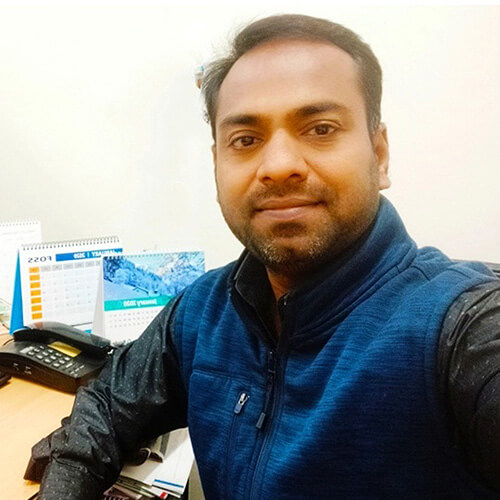
Google Scholar / Social Media
Name : Shri. Pranav R. Kshirsagar
Designation : Scientist – E, Bioenergy Group
Brief Background :
Chemical Engineering Scientist with expertise in natural product extraction, fermentation technology and bioenergy. Proven experience in the extraction and recovery of Azolla protein, along with optimization of process parameters using statistical methods. Skilled in biohydrogen and biomethane technologies, with a strong focus on the techno-economics of bioprocesses and chemical processes. Extensive experience in optimizing process parameters, design and development of process equipment, performing mass and energy balances, and analysing bioreaction dynamics in Continuous Stirred Tank Reactors (CSTRs) and technology demonstration and transfer. Proven ability to develop and implement effective operating strategies that enhance yield, efficiency, and sustainability in bioprocessing and chemical processing.
Shri. Pranav Kshirsagar, trained in chemical engineering, has developed expertise in process-specific mathematical modelling and statistical optimization techniques. His work revolves around improving process parameters to achieve optimal yields and productivity, particularly in microbial and chemical processes. He has extensive experience in operating large-scale digester, fermenters and downstream equipment, overseeing the scaling-up of processes. His contributions also include optimizing the large-scale recovery of proteins and enzymes, which are crucial for industrial biotechnology applications. Additionally, Mr. Kshirsagar’s expertise extends to conducting scale-up studies to ensure that processes remain efficient and sustainable when transitioned to larger production volumes.
Contact Details :
+91-20-25325121 (Office)
Educational Qualification
- Chemical Engineering (BE, M.Tech.)
Research Interests
Mr. Kshirsagar’s team at ARI is dedicated to exploring process parameter optimization by utilizing both conventional mathematical modelling and statistical-based techniques RSM, Taguchi, and Mixed design etc. Their research focuses on enhancing the yield and productivity of microbial and chemical processes, aiming to develop more efficient and sustainable processes. The team’s work is key in improving process performance through systematic modelling approaches, which allow for better control and optimization of variables that influence microbial fermentation and chemical production. By focusing on these methods, they aim to achieve increased sustainability and process efficiency in industrial applications.
- Bioenergy solutions (Biofuels: Biohydrogen and biomethane etc.)
- Extraction and recovery of protein and enzymes
- Design, and development of process equipments
- Process parameters optimization and kinetics, Mass and Energy balance
- Demonstration, Upscaling of technology and technology transfer
- Development of mathematical models for enhanced productivity
- Set up and Handling of pilot scale plants
- Larger scale process development studies
- Interested in studying the statistical optimization, kinetics and mathematical modelling and simulations, mass and energy balance, upscaling of aerobic and anaerobic fermentation processes, bioenergy, and techno-economic evaluation of processes
- Sponsored projects, research contracts , strategic process development.
- Consultancies and technical services to universities, institution and industries.
- Training on analytical sophisticated instruments, aerobic anaerobic fermentations, continuous centrifuge
Research Papers.: 14, Patents: Patent Filed: 04, Book Chapter: 02, Technology Transferred.: 02
Total number of publications: 19, Citation index: 436, H – Index: 09
- Pranav R. Kshirsagar, Snehal O. Kulkarni, Smita S. Nilegaonkar, Niveditha M., Pradnya P. 2013. Kanekar Kinetics and model building for recovery of polyhydroxyalkanoate (PHA) from Halomonascampisalis. Separation and Purification Technology, 103: 151-160. (IF: 9.316), https://doi.org/10.1016/j.seppur.2012.10.007
- Pranav Kshirsagar, Rahul Suttar, Smita Nilegaonkar, Snehal Kulkarni, Pradnya Kanekar. 2013. Scale up production of polyhydroxyalkanoate (PHA) at different
- aeration, agitation and controlled dissolved oxygen levels in fermenter using Halomonascampisalis MCM B-1027 . Journal of Biochemical Technology. 4(1):512-517.
- Deepa J. Shetty , Pranav Kshirsagar, Sneha Tapadia-Maheshwari, Vikram Lanjekar, Sanjay K. Singh Prashant K. Dhakephalkar. 2017. Alkali pretreatment at ambient temperature: A promising method to enhance biomethanation of rice straw. Bioresource Technology, 226, 80-88. (IF: 9.642) , https://doi.org/10.1016/j.biortech.2016.12.003
- Preeti Arora, P.R. Kshirsagar, Dolly Pal Rana, P.K. Dhakephalkar. 2019. Hyperthermophilic Clostridium sp. N-4 Produceda Glycoprotein Biosurfactant that Enhanced Recovery of Residual Oil at 96 °C in Lab Studies. Colloids and Surfaces B: Biointerfaces, 182, 110372. (IF: 5.268), https://doi.org/10.1016/j.colsurfb.2019.110372
- P. Zambare, S. S. Nilegaonkar, P. R. Kshirsagar, P. P. Kanekar. 2014. Scale up production of Protease using Pseudomonas aeruginosa MCM B-327 and its Detergent Compatibility J. Biochem. Tech (2014) 5(2): 698-707
- Rameshwar Avachar, Vikram Lanjekar, Pranav Kshirsagar, Prashant K Dhakephalkar, Sumit Singh Dagar, Abhishek Baghela. 2021. Buffalo rumen harbours diverse thermotolerant yeasts capable of producing second-generation bioethanol. Renewable energy, 173, 795-807. (IF: 8.001), https://doi.org/10.1016/j.renene.2021.04.002
- Padmanabh Mishra, Pranav Kshirsagar, Smita Nilegaonkar, Sanjay Singh. 2012. Statistical optimization of medium components for production of extracellular chitinase by Basidiobolusranarum: a novel biocontrol agent against plant pathogenic fungi.Journal of Basic Microbiology, 52, 1-10.(IF: 2.281), https://doi.org/10.1016/j.renene.2021.04.002
- Snehal O. Kulkarni, Pradnya P. Kanekar, Jyoti P. Jog, Prashant A. Patil, Smita S. Nilegaonkar, Seema S. Sarnaik, Pranav R. Kshirsagar. 2011. Characterisation of copolymer, poly(hydroxybutyrateco-hydroxyvalerate) (PHB-co-PHV) produced by Halomonascampisalis (MCM B-1027), its biodegradability and potential application. Bioresource Technology, 102, 6625- 6628.(IF: 9.642) https://doi.org/10.1016/j.biortech.2011.03.054
- Bioaugmentation of anaerobic fungus Orpinomycesjoyonii boosts sustainable biomethanation of rice straw without pretreatment. Biomass and Bioenergy, 138 (105546), 1-5 138(105546), 1-5, https://doi.org/10.1016/j.biombioe.2020.105546
- S Pandey, D Mukherjee, P Kshirsagar, C Patra, D Bodas. 2021. Multiplexed bio-imaging using cadmium telluride quantum dots synthesized by mathematically derived process parameters in a continuous flow active microreactor. Materials Today Bio, 11, 100123. https://doi.org/10.1016/j.mtbio.2021.100123
Research Publications-11, Book Chapters-02, Cumulative impact factor- 40.158, ‘h’ index- 05, i10 index-05
- Deepa Shetty, Akshay Joshi, Sumit Singh Dagar, Pranav Kshirsagar, Prashant K. Dhakephalkar. Bioaugmentation of anaerobic fungus Orpinomyces joyonii boosts sustainable biomethanation of rice straw without pretreatment. Biomass and Bioenergy, 138, 105546.
- Anupama S. Engineer, Kunal K. Yadav, Pranav R. Kshirsagar, Prashant K. Dhakephalkar. 2020. A novel enantioselective, thermostable recombinant hydantoinase to aid the synthesis of industrially valuable non-proteinogenic amino acids. Enzyme microbial Technology,138, 109554, 1-8.
- Preeti Arora, Pranav.R. Kshirsagar , Dolly Pal Rana , Prashant K. Dhakephalkar. Hyperthermophilic Clostridium sp. N-4 produced a glycoprotein biosurfactant that enhanced recovery of residual oil at 96 °C in lab studies.Colloids and Surfaces B. Biointerfaces, 182. 110372.1-7.
- Singh, Tanya; Kshirsagar, Pranav R; Das, Anindita; Yadav, Kunal; Mallik, Sweta; Mascarenhasâ€Pereira, MBL; Thomas, Tresa Remya A; Shivaramu, Mamatha S; LokaBharathi, PA; Khadge, NH. 2019. Implications of Microbial Thiosulfate Utilization in Red Clay Sediments of the Central Indian Basin: The Martian Analogy. Geochemistry, Geophysics, Geosystems. 20(2) 708-729.
- Anindita Das , Tanya Singh, P.A. LokaBharathi , Prashant K. Dhakephalkar , Sweta Mallik, Pranav R. Kshirsagar, N.H. Khadge , B. Nagender Nath et al. 2017. Astrobiological implications of dim light phototrophy in deep-sea red clays., Life Sciences in Space Research. 12, 39–50.
- Deepa J Shetty, Pranav Kshirsagar, Sneha Tapadia-Maheshwari, V Lanjekar, S K.Singh, P. K. Dhakephalkar*. 2017. “Alkali pretreatment at ambient temperature: A promising method to enhance biomethanation of rice straw.” Bioresource technology. 226: 80-88.
- Vasudeo P Zambare, Smita Nilegaonkar, Pranav Kshirsagar, PP Kanekar.2014. Scale up production of Protease using Pseudomonas aeruginosa MCM B-327 and its Detergent Compatibility. Journal of Biochemical Technology, 5(2) 698-707
- Kshirsagar, Pranav R; Kulkarni, Snehal O; Nilegaonkar, Smita S; Niveditha, M; Kanekar, Pradnya P. 2013. “Kinetics and model building for recovery of polyhydroxyalkanoate (PHA) from Halomonas campisalis.” Separation and Purification Technology, 103, 151-160
- Kshirsagar, Pranav R; Suttar, Rahul; Nilegaonkar, Smita Shrikant; Pradhan, Snehal; Kanekar, Pradnya P. 2012. Scale up production of polyhydroxyalkanoate (PHA) at different aeration, agitation and controlled dissolved oxygen levels in fermenter using Halomonas campisalis MCM B-1027. Journal of Biochemical Technology, 4(1), 512-51
- Mishra, P. R. Kshirsagar, S. S. Nilegaonkar* and S. K. Singh. 2012. Statistical optimization of medium components for production of extracellular chitinase by Basidiobolus ranarum: a novel biocontrol agent against plant pathogenic fungi. Journal of Basic Microbiology. 52, 1-10
- Kulkarni, Snehal O; Kanekar, Pradnya P; Jog, Jyoti P; Patil, Prashant A; Nilegaonkar, Smita S; Sarnaik, Seema S; Kshirsagar, Pranav R. (2011). “Characterisation of copolymer, poly (hydroxybutyrate-co-hydroxyvalerate)(PHB-co-PHV) produced by Halomonas campisalis (MCM B-1027), its biodegradability and potential application.” Bioresource Technology 102(11): 6625-6628.

Google Scholar / Social Media
Name : Dr. Tushar Lodha
Designation : Scientist B
Brief Background :
A competent and passionate researcher with experience in studying microbial diversity of various habitats especially ‘not yet cultivated’, anaerobic, ammonia oxidizing bacteria (Anammox), anoxygenic phototrophic bacteria (APB), genome enrichments, sequencing, comparative genomics, genome-based taxonomy.
The microbes having potential antimicrobial compounds to combat antimicrobial resistance (AMR) infections was discovered.
I am working on a Bio-CNG process and extending the research area in microbial electrosynthesis of biofuels. The potential conversion of biogas slurry into value-added products will be taken further.
The group is aimed to work further on understanding the microbial dynamics of various ecosystems using next generation sequencing approach and developing new methods and techniques to increase the culturability of the not-yet cultured microbes and exploiting its biotechnological potential.
Contact Details :
ResearchGate: https://www.researchgate.net/profile/Tushar-Lodha
Educational Qualification
- B.Sc. Biotechnology, SPPU, Pune
- M.Sc. Biotechnology, Visva-Bharati University, Santiniketan, West Bengal
- Ph.D. Microbiology, University of Hyderabad
- Ph.D. topic: Mining bacteria for hopanoids and genomic insights of hopanogenesis; A critical analysis of global transcriptional response of shc mutant of Rhodopseudomonas palustris TIE-1
Research Interests
- Microbial electrosynthesis of Biofuel
- Bio-CNG from different feedstocks: Pretreatment, optimization and process development
- Microbial systematics and ecology
Publications:
- Holkar, SK., Ghotgalkar, PS., Lodha, T., Bhanbhane, VC., Shewale, SA., Markad, H., Shabeer, ATP., Saha, S. (2023) Biocontrol potential of endophytic fungi originated from grapevine leaves for management of anthracnose disease caused by Colletotrichum gloeosporioides. 3 Biotech, 13 (7), 1-20
- Mukherjee, S., Lodha, T., Madhuprakash, J. (2023) Comprehensive genome analysis of cellulose and xylan-active CAZymes from the genus Paenibacillus: Special emphasis on the novel xylanolytic Paenibacillus sp. LS1. Microbiology Spectrum, 11 (3), e05028-22
- Joshi, A., Thite, S., Lodha, T., Joseph, N., Mengade, P. (2023) Genomic insights of an alkaliphilic bacterium Halalkalibacter alkaliphilus sp. nov. isolated from an Indian Soda Lake. Antonie van Leeuwenhoek, 116 (5), 435-445
- Thorat, V., Kirdat, K., Tiwarekar, B., Dhanavade, P., Karodi, P., Shouche, Y., Sathe, S., Lodha, T., Yadav, A. (2023) Paenibacillus albicereus sp. nov. and Niallia alba sp. nov., isolated from digestive syrup. Archieves of Microbiology, 204, 127.
- Ghare, U., Narvekar, S., Lodha, T., Mallebhari, R., Dastager, S., Barvkar, VT., Dhotre, D., Karmalkar, N., Pable, A. (2023) Bacterial communities and diversity of western ghats soil: A study of a biodiversity hotspot. Current Microbiology, 80 (4), 108
- Sivaraman, GK., Gupta, SS., Visnuvinayagam, S., Muthulakshmi, T., Elangovan, R., Perumal, V., Balasubramanium, G., Lodha, T., Yadav A. (2022) Prevalence of S. aureus and/or MRSA from seafood products from Indian seafood products. BMC microbiology, 22 (1), 233
- Chauhan, NS., Joseph, N., Shaligram, S., Chavan, N., Joshi, A., Dhotre, D., Lodha, T., Shouche Y. (2022). Paenibacillus oleatilyticus sp. nov., isolated from soil. Archives of Microbiology, 204 (8), 516
- Thorat, V., Tiwarekar, B., Kirdat, K., Chavan, S., Markad, S., Sathe, S., Lodha, T., Yadav, A. (2022). Hydrogenophaga crocea sp. nov. associated with cyanobacterial mat isolated from farmland mud. Archives of Microbiology, 204 (5), 265
- Ray, P., Lodha, T., Biswas, A., Ramana Ch.V. (2022) Particle specific physical and chemical effects on antibacterial activities: A comparative study involving gold nanostars, nanorods and nanospheres. Colloids Surf, A Physicochem Eng Asp 634, 127915 .
- Lodha T.#, Narvekar S. and Karodi K. Classification of uncultivated anammox bacteria and Candidatus Uabimicrobium into a new classes and provisional nomenclature as Candidatus Brocadiia classis nov. and Candidatus Uabimicrobiia classis nov. of the phylum Planctomycetes and novel family Candidatus Scalinduaceae fam. nov to accommodate the genus Candidatus Scalindua. Systematic and Applied Microbiology, 44, 126272.
- Joshi A., Thite S., Karodi P., Joseph N., and Lodha T.# 2021. Alkalihalobacterium elongatum gen. nov. sp. nov. an antibiotic-producing bacterium isolated from Lonar Lake and reclassification of the genus Alkalihalobacillus into seven novel genera. Frontiers in Microbiology, 12, 722369.
- Kajale S., Deshpande N., Lodha T., Shouche Y. and Sharma S. 2021. Natronococcus pandeyae sp. nov. a novel haloarchaeon from Sambhar Salt Lake. Current Microbiology (Accepted).
- Jagtap C. B., Rama R. M., Tiwari O.K., Titus S., Lodha T.# 2021. Genome sequence of an obligate hydrocarbonoclastic bacterium Alcanivorax marinus NMRL4 isolated from oil polluted seawater of the Arabian Sea. Marine Genomics. doi.org/10.1016/j.margen.2021.100875
- Thorat V., Kirdat K., Tiwarekar B., Debbarma P., Shouche Y., Sathe S., Goel R., Lodha T., and Yadav A. 2020. Pseudomonas lalkuanensis sp. nov., isolated from bacterial consortia of contaminated soil for the remediation of e-waste. Int J Syst Evol Microbiol, 70:6468–6475.
- Suresh G., Lodha T.*, Indu B., Sasikala Ch. and Ramana Ch.V. 2020. Corrigendum: Taxogenomics resolves conflict in the genus Rhodobacter: A two and half decades pending thought to reclassify the genus Rhodobacter. Front. Microbiol., 11:1111.
- Suresh G., Lodha T.*, Indu B., Sasikala Ch. and Ramana Ch.V. 2019. Taxogenomics resolves conflict in the genus Rhodobacter: A two and half decades pending thought to reclassify the genus Rhodobacter. Front. Microbiol., 10: 2480.
- Lodha T., Indu B., Sasikala Ch. and Ramana Ch.V. 2019. Transcriptome analysis of hopanoid deficient mutant of Rhodopseuodomonas palustris TIE-1. Microbiological Research. 218, 108-117.
- Suresh G., Lodha T., Sasikala Ch. and Ramana Ch.V. 2018. Rhodobacter alkalitolerans sp. nov. isolated from an alkaline brown pond. Archives of Microbiology, 200: 1487-1492.
- Lakshmi K.V.N.S., Lodha T., Abdullah M., Guruprasad L., Sasikala Ch. and Ramana Ch.V. 2018. Insights into the carbonic anhydrases and autotrophic carbon dioxide fixation pathways of high CO2 tolerant Rhodovulum viride JA756. Microbiological Research, 215: 130-140.
- Yadav S., Vaddavalli R., Siripuram S., Eedara R.V.V., Yadav S., Rabishankar O., Lodha T., Sasikala Ch. and Ramana Ch.V. 2018. Planctopirus hydrillae sp. nov., an antibiotic producing Planctomycete isolated from the aquatic plant Hydrilla and its whole genome shotgun sequence analysis. The Journal of Antibiotics, 71(6):575-583.
- Srinivas A., Divyasree B., Sasikala Ch., Lodha T., Bharti D. and Ramana Ch.V. 2016. Description of Jeotgalibacillus alkaliphilus sp. nov., isolated from a solar salt pan, and Jeotgalibacillus terrae sp. nov., a name to replace ‘Jeotgalibacillus soli’ Chen et al. 2010 Int J Syst Evol Microbiol, 66, 5167-5172.
- Sasijyotsana T. S., Lodha T., Sasikala Ch. and Ramana Ch.V. 2016. Erratum to Paraclostridium benzoelyticum gen. nov. sp. nov., isolated from marine sediment and reclassification of Clostridium bifermentans as Paraclostridium bifermentans comb. nov. Proposal of a new genus Paeniclostridium gen. nov. to accommodate Clostridium sordellii and Clostridium ghonii. Int J Syst Evol Microbiol. 66, 1268-1274.
- Sravanthi T., Lodha T., Sasikala Ch. and Ramana Ch.V. 2016. Alkalispirochaeta cellulosivorans gen. nov., sp. nov., a novel cellulose hydrolyzing, alkaliphilic, halotolerant bacterium isolated from the gut of wood eating cockroach (Cryptocercus) and reclassification of four Spirochaeta spp. Int J Syst Evol Microbiol. 66,1612-9.
- Sasijyotsana T. S., Lodha T., Sasikala Ch. and Ramana Ch.V. 2016. Paraclostridium benzoelyticum gen. nov. sp. nov., isolated from marine sediment and reclassification of Clostridium bifermentans as Paraclostridium bifermentans comb. nov. Proposal of a new genus Paeniclostridium gen. nov. to accommodate Clostridium sordellii and Clostridium ghonii. Int J Syst Evol Microbiol. 66, 1268-1274
- Sadaf K., Lodha T., Nirosha P., Appa Rao P., Sasikala Ch. and Ramana Ch.V. 2016. Paenibacillus arachidis sp. nov., isolated from groundnut seeds. Int J Syst Evol Microbiol 66, 2923-2928
- Srinivas A., Divyasree B., Lodha T., Sasikala Ch. and Ramana Ch.V. 2016. Salinicoccus amylolyticus sp. nov., isolated from a saltern. Int J Syst Evol Microbiol, 66, 3814-3820
- Ramaprasad E.V.V., Lodha T., Bharti D., Sasikala Ch. and Ramana Ch.V. 2016. Rhodovulum algae sp. nov., isolated from an algal mat. Int J Syst Evol Microbiol, 66, 3367-3371
- Lodha T., Srinivas A., Sasikala Ch. and Ramana Ch.V. 2015. Hopanoid inventory of the genus Rhodoplanes. Archieves of Microbiology. 197, 861-867
- Shivani Y., Subhash Y., Lodha T., Sasikala Ch. and Ramana Ch.V. 2015. Spirochaeta lutea sp. nov., isolated from marine habitats and emended description of the genus Spirochaeta. Syst Appl Microbiol. 38, 110-114
- Lodha T., Sravanthi T., Sasikala Ch. and Ramana Ch.V. 2015. Draft genome sequence of Spirochaeta sp. strain JC202, an endosymbiont of the Termite (Isoptera) gut. Genome Announc. 3, e01481-14
- Lodha T., Sasi Jyothsna T.S., Sasikala Ch. and Ramana Ch.V. 2015. Draft Genome sequence of antimicrobial-producing Clostridium sp. JC272, isolated from marine sediment. Genome Announc. 3, e00650-15
- Sravanthi T., Lodha T., Sasikala Ch. and Ramana Ch.V. 2015. Spirochaeta odontotermitis sp. nov., a novel obligately anaerobic, cellulolytic, halotolerant, alkaliphilic spirochaete isolated from the termite, Odontotermes obesus (Rambur) gut. Int J Syst Evol Microbiol. 65, 4589-94.
- Lodha T., Sasikala Ch. and Ramana Ch.V. 2014. Draft genome sequence of Rhodomicrobium udaipurense JA643T with special reference to hopanoid biosynthesis. DNA Research. 21, 639-647
- Rahul D., Sasikala Ch., Lodha T., Roy D. and Ramana Ch.V. 2014. Alcanivorax xenomutans sp. nov., a hydrocarbonoclastic bacterium isolated from a shrimp pond. Int J Syst Evol Microbiol. 64, 3553-8
- Srinivas A., Vinay Kumar B., Divya Sree B., Lodha T., Sasikala Ch. and Ramana Ch. V. 2014. Rhodovulum salis sp. nov. and Rhodovulum viride sp. nov., phototrophic Alphaproteobacteria isolated from marine habitats. Int J Syst Evol Microbiol, 64, 957–962
- Subhash Y., Lodha T., Sasikala Ch. and Ramana ChV. 2013. Erythrobacter odishensis sp. nov. and Pontibacter odishensis sp. nov. isolated from a dry soil of a solar saltern. Int J Syst Evol Microbiol, 63, 4524-32
- Kathiravan R., Jegan S., Ganga V., Prabavathy V.R., Lodha T., Sasikala Ch. and Ramana Ch.V. 2013. Ciceribacter lividus gen. nov., sp. nov., isolated from rhizosphere soil of chick pea (Cicer arietinum L.). Int J Syst Evol Microbiol, 63, 4484-8
- Vishnuvardhan S. R., Lodha T., Sasikala Ch. and Ramana Ch.V. 2013. Cohaesibacter haloalkalitolerans sp. nov., isolated from Lonar soda lake, India and emended description of the genus Cohaesibacter. Int J Syst Evol Microbiol, 63, 4271-6
- Subhash Y., Lodha T., Sasikala Ch. and Ramana Ch.V. 2013. Mongoliicoccus alkaliphilus sp. nov. and Litoribacter alkaliphilus sp. nov. isolated from salt pans. Int J Syst Evol Microbiol, 63, 3457-62
- Ramana V.V., Shalem Raj P., Lodha T., Sasikala Ch. and Ramana Ch.V. 2013. Rhodomicrobium udaipurense sp. Nov., a psychrotolerant phototrophic alphaproteobacterium isolated from a fresh water stream. Int J Syst Evol Microbiol, 63, 2684-9
- Subhash Y., Lodha T., Sasikala Ch. and Ramana Ch.V. 2013. Falsirhodobacter halotolerans gen. nov., sp. nov., isolated from a dry soil of a solar saltern. Int J Syst Evol Microbiol, 63, 2132-7
- Vishnuvardhan S.R., Aspana S., Lodha T., Sasikala Ch. and Ramana Ch.V. 2013. Spirochaeta sphaeroplastigenens sp. nov., a novel halo-alkaliphilic, obligately anaerobic spirochaete isolated from soda lake Lonar, India. Int J Syst Evol Microbiol, 63, 2223-8
- Subhash Y., Lodha T., Sasikala Ch. and Ramana Ch.V. 2013. Vogesella alkaliphila sp. nov., isolated from an alkaline soil, and emended description of the genus Vogesella. Int J Syst Evol Microbiol, 63, 2338-43
- Ramana Ch.V., Srinivas A., Subhash Y., Lodha T., Mukharjee T., Usha Kiran P. and Sasikala Ch. 2013. Salinicoccus halitifaciens sp. Nov., a novel bacterium participating in halite formation. Antonie van Leeuwenhoek., 103, 885-98
- Lodha T., Karmakar J., Roychoudhuri R. and Dey N. 2011. Assessment of genetic diversity of some commonly grown rice genotypes of South Bengal using microsatellite markers associated with the saltol QTL mapped on 1st Chromosome. NBU Journal of Plant Sciences. 5:35-39

Google Scholar / Social Media
Name : Dr. Neelam Kapse
Designation : Scientist B
Brief Background :
Ph.D. in Microbiology with a strong expertise in extremophile research, petroleum microbiology and genomics. In the past ten years of my professional research career, I’ve received substantial training in molecular biology, anaerobic microbiology, next-generation sequencing and analysis, and scientific writing. I now look forward to expand my horizons in the field of Bioenergy research by working with experts in academia as well as industrial setups.
Contact Details :
Educational Qualification
- B.Sc. Microbiology, SPPU
- M.Sc. Microbiology, SPPU
- Ph.D. Microbiology, SPPU
- Ph.D. topic: Influence of microbial metabolism and reservoir properties on enhanced oil recovery: Insights from simulated laboratory studies
Research Interests
- Exploration of pristine habitats for taxonomic novelty and biotechnological potential
- Bioprospecting of extremophiles for biotechnology applications Mechanistic insights into probiotic mode of action
Publications:
- Kapse, N.G., Paliwal, V., Dagar, S.S., Rana, D.P. and Dhakephalkar, P.K., 2021, Genomics and simulated laboratory studies reveal Thermococcus sp. 101C5 as a novel hyperthermophilic archaeon possessing a specialized metabolic arsenal for enhanced oil recovery. Antonie van Leeuwenhoek, pp.1-13.
- Singh, P., Kapse, N., Gowdaman, V., Tsuji, M., Singh, S.M. and Dhakephalkar, P.K., 2021. Comparative Genomic Analysis of Arctic Permafrost Bacterium Nesterenkonia sp. PF2B19 to Gain Insights into Its Cold Adaptation Tactic and Diverse Biotechnological Potential. Sustainability, 13(8), p.4590.
- Kapse, N.G., Engineer, A.S., Gowdaman, V., Wagh, S. and Dhakephalkar, P.K., 2019. Functional annotation of the genome unravels probiotic potential of Bacillus coagulans HS243. Genomics, 111(4), pp.921-929.
- Kapse, N.G., Engineer, A.S., Gowdaman, V., Wagh, S. and Dhakephalkar, P.K., 2018. Genome Profiling for Health Promoting and Disease Preventing Traits Unraveled Probiotic Potential of Bacillus clausii B106. Microbiology and Biotechnology Letters, 46(4), pp.334-345.
- Singh, P., Kapse, N., Roy, U., Singh, S.M. and Dhakephalkar, P.K., 2017. Draft genome sequence of permafrost bacterium Nesterenkonia sp. strain PF2B19, revealing a cold adaptation strategy and diverse biotechnological potential. Genome announcements, 5(15), pp.e00133-17.
- Kapse, N., Singh, P., Roy, U., Singh, S.M. and Dhakephalkar, P.K., 2017. Insights into the Psychrophilic and Sea Ice-Specific Lifestyle of Marinobacter sp. Strain AC-23: a Genomic Approach. Genome announcements, 5(15), pp.e00134-17.
- Antony, R., Sanyal, A., Kapse, N., Dhakephalkar, P.K., Thamban, M. and Nair, S., 2016. Microbial communities associated with Antarctic snow pack and their biogeochemical implications. Microbiological research, 192, pp.192-202.
- Kamalaskar, L., Kapse, N., Pore, S., Dhakephalkar, A.P., Ranade, D.R. and Dhakephalkar, P.K., 2016. Genome sequence and gene expression studies reveal novel hydrogenases mediated hydrogen production by Clostridium biohydrogenum sp. nov., MCM B-509T. International Journal of Hydrogen Energy, 41(28), pp.11990-11999.
- Rahalkar, M.C., Pandit, P.S., Dhakephalkar, P.K., Pore, S., Arora, P. and Kapse, N., 2016. Genome characteristics of a novel type I methanotroph (Sn10-6) isolated from a flooded Indian rice field. Microbial ecology, 71(3), pp.519-523.
- Pandit, P.S., Rahalkar, M.C., Dhakephalkar, P.K., Ranade, D.R., Pore, S., Arora, P. and Kapse, N., 2016. Deciphering community structure of methanotrophs dwelling in rice rhizospheres of an Indian rice field using cultivation and cultivation-independent approaches. Microbial ecology, 71(3), pp.634-644.
- Rahalkar, M.C., Pore, S., Arora, P., Pandit, P., Kapse, N., Bahulikar, R., Schink, B. and Dhakephalkar, P.K., 2015. Draft genome of Elstera litoralis, a freshwater epilithic biofilm associated bacterium from littoral zone of Lake Constance. Marine genomics, 24, pp.223-224.
- Singh, P., Kapse, N., Arora, P., Singh, S.M. and Dhakephalkar, P.K., 2015. Draft genome of Cryobacterium sp. MLB-32, an obligate psychrophile from glacier cryoconite holes of high Arctic. Marine genomics, 21, pp.25-26.
- Saxena, N., Pore, S., Arora, P., Kapse, N., Engineer, A., Ranade, D.R. and Dhakephalkar, P.K., 2015. Cultivable bacterial flora of Indian oil reservoir: isolation, identification and characterization of the biotechnological potential. Biologia, 70(1), pp.1-10.
- Palande, V., Meora, R., Sonavale, R.M., Makashir, M., Modak, M.S., Kapse, N., Dhakephalkar, P.K., Ranjekar, P.K. and Kunchiraman, B.N., 2015. Inhibition of pathogenic strains of Candida albicans and non-albicans by Bacillus species isolated fromtraditional Indian fermented food preparations. Int J Curr Microbiol App Sci, 4, pp.691-699
Fellowships
- CSIR-SRF (Senior Research Fellowship), 2017
- Lectureship-NET (National Eligibility Test for Assistant Professor) – Council of Scientific and Industrial Research (CSIR) and University Grants Commission (UGC), Govt. of India, 2016, All India Rank- 26.
- ICAR-NET for Assistant Professor/ Lecturer conducted by Agricultural Scientist Recruitment Board (ASRB), 2016

Google Scholar / Social Media
Name : Dr. Vikram B. Lanjekar
Designation : Technical Officer – B
Brief Background :
- Ecology & Physiology of methanogenic archaea, anaerobic bacteria and anaerobic fungi; Biomass to biomethanation, bioethanol, biohydrogen, biobutanol, etc; human and rumen gut microbiota and health dynamics.
- Training staff and students in anaerobic microbiology.
- Culture collection of anaerobic bacteria, methanogenic archaea and anaerobic fungi as MCM activity.
- Projects, consultancies and technical services to industries and institutes.
Contact Details :
02025325113 (Telephone)
+91 9325643132 , 7741909995 (Mobile)
Educational Qualification
- Ph.D. Microbiology
List of Publications
Publications- 15/ Patents-1/ Book chapters- 4/
DST-SERB Young scientist project-1/
Citations-363; h-index- 8; i10-index- 6
Awards- 4
- Tiwari S, Avchar R, Arora R, Lanjekar VB, Dhakephalkar PK, Dagar SS, Baghela A (2020). Xylanolytic and Ethanologenic Potential of Gut Associated Yeasts from Different Species of Termites from India. Mycobiology, 1-11
- Hanafy RA, Lanjekar VB, Dhakephalkar PK, Callaghan TM, Dagar SS, Griffith GW, Elshahed MS, Youssef NH (2020). Seven new Neocallimastigomycota genera from fecal samples of wild, zoo-housed, and domesticated herbivores: Description of Ghazallomycesconstrictus nov., sp. nov., Aklioshbomycespapillarum gen. nov., sp. nov., Agriosomyceslongus gen. nov., sp. nov., Capellomycesforaminis gen. nov., sp. nov. and Capellomyceselongatus sp. nov., Joblinomycesapicalis gen. nov., sp. nov., Khoyollomycesramosus gen. nov., sp. nov., and Tahromycesmunnarensis gen. nov., sp. nov. Mycologia (Joshi A, Lanjekar V B, Dhakephalkar P K, Callaghan TM, Griffith GW and Dagar S S (2018). Liebetanzomycespolymorphus gen. et sp. nov., a new anaerobic fungus (Neocallimastigomycota) isolated from the rumen of a goat. MycoKeys 40, 89.
- Joshi A, Lanjekar V B, Dhakephalkar P K, and Dagar S S (2018). Cultivation of multiple genera of hydrogenotrophic methanogens from different environmental niches Anaerobe50, 64-68.
- ShettyD J, KshirsagarP, Tapadia S, LanjekarV B, SinghS K and Dhakephalkar P K (2017). Alkali pretreatment at ambient temperature: a promising method to enhance biomethanation of rice straw. Bioresource Technology 226; 80–88.
- Lanjekar V B, Deshpande M G, Padmanabhan G, Dnyansagar V R, Ranade D R, Dhakephalkar P K (2016). Development of a Bioprocess to Reduce Pathogenic Load and Malodor of Human Night Soil. South Asian J ExpBiol; 5 (6): 251-257.
- Lanjekar V B, Marathe N P, Shouche Y S and Ranade D R (2015). Clostridium punense nov., an obligate anaerobic bacteria isolated from human faeces. Int J SystEvolMicrobiol 65, 4749–4756.
- Lanjekar V B,Marathe N P, Shouche Y S and Ranade D R (2014). Megasphaera indica nov., an obligate anaerobic bacteria isolated from human faeces. Int J SystEvolMicrobiol, 64: 7, 2250-2256.
- Shetty S A., Marathe N P., Lanjekar V B, Ranade D Rand Shouche Y S (2013) Comparative genome analysis of Megasphaera reveals niche specialization and its potential role in the human gut. PLOS ONE8(11),e79353.
- Marathe N P, Shetty S, Lanjekar V B, Ranade D R and Shouche Y S (2012). Changes in human gut flora with age: an Indian familial study. BMC Microbiol, 12: 222, 1-10.
- Patent Application No: 2072/MUM/2012; Entitled “Degradation of human faeces, reduction in mal odour formation and inhibition of entero-pathogens by ARI consortium: Quantitative evaluation study” Inventors: Ranade D R, Dhakephalkar P K, Lanjekar V B, Deshpande M G,Padmanabhan G and Dnyansagar R V.
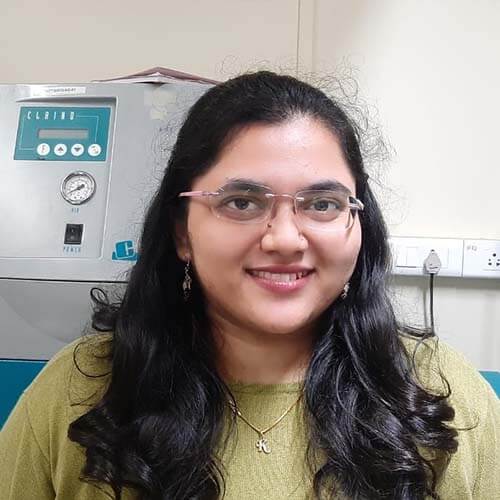
Name : Kalyani Deshmukh
Designation : Project Associate-II
Brief Background :
- University rank holder at SavitribaiPhule Pune University stood ninth (9th) in order of merit in B.Sc Microbiology 2012-2015.
- Qualified :
- CSIR NET JRF in June 2016 and secured AIR-107.
- UGC NET JRF in December 2017 AIR-118.
- Lectureship-NET CSIR in December 2015AIR-67.
- Lectureship-NET CSIR in June 2017 AIR-98.
- GATE February 2017
- JNU- CEEB (Jawaharlal Nehru University – Combined Entrance Examination for Biotechnology) AIR – 46.
- Qualified the National Institute of Viorology(NIV) Entrance Examination AIR 08.
- Worked as Assistant Professor in Department of Microbiology at Dr.D.Y. Patil Arts, Commerce and Science College, Pimpri, Pune.
Did On Job Training at Serum Institute of India for a period of 16th – 30th November 2012. Various techniques were explained in Bacterial vaccine production, viral vaccine production, Quality control Department, Screening and Packaging Department.
Contact Details :
Educational Qualification
- B.Sc Microbiology from SPPU 2015 (University rank holder)
- M.Sc Biotechnology from MSU Baroda
Research Interests
- Biofuel production from waste, Bioremediation, Environmental microbiology, Immunology
- PhD topic: Biohydrogen production from Rice straw via dark fermentation route
Publications / Patents / Varieties
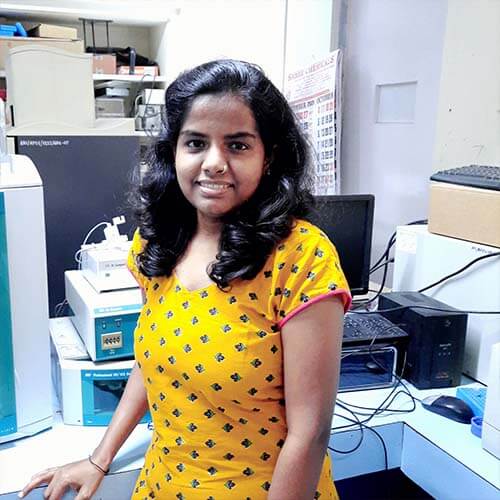
Name : Payal Deshpande
Designation : PhD student
Brief Background :
After completing my M.Sc. degree in 2016, I cleared CSIR-NET exam for JRF with AIR 31. I joined ARI in 2017 and got registered for Ph.D. in June 2018
Contact Details :
Educational Qualification
- B.Sc. Industrial Microbiology (2011-2014,SPPU)
- M.Sc. Microbiology (2014-2016, SPPU)
Research Interests
My core research interests are rice straw biomethanation, cultivation and maintenance of anaerobic fungi and fermenter scale studies.
Currently, I am working on enhancing the biomethanation of rice straw using anaerobic fungi as primary degraders.
Publications / Patents / Varieties
-
-
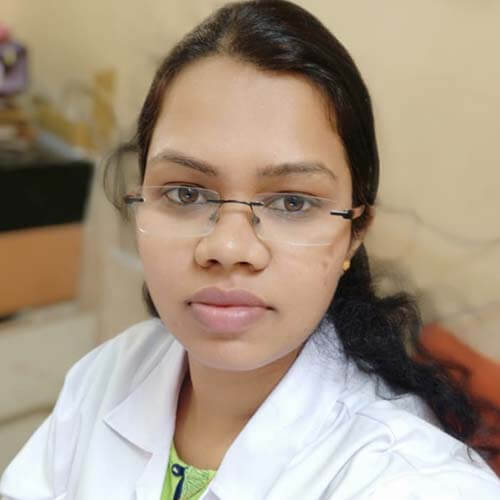
Name : Prajakta Bhujbal
Designation :PhD Student
Brief Background :
I have joint Bioenergy group of Agharkar Research Institute in 2020 as UGC-Junior Research Fellow. I am intent to perform anaerobic biomethanation process development. Previously I experienced in wine making and its process in Fratelli Wines Pvt. Ltd, Akluj Maharashtra. Also I have worked in Vasantdada Sugar Institute ,Manjari Pune on Sugar Industry waste management and second generation ethanol production.
Contact Details :
Educational Qualification
- B.Sc. Microbiology from Savitribai Phule Pune University (2011),
- M.Sc. Wine Brewing and Alcohol Technology from Savitribai Phule Pune University (2013)
- UGC NET JRF (2018)
Research Interests
Microbiology, Alcohol Technology, Wine making,Anaerobic Microbiology, Fermentation Technology
Publications / Patents / Varieties

Name : Prajakta Dnyaneshwar Margale
Designation :Project Assistant
Brief Background :
Following my M.Sc., I began working as a Project Assistant at the Agharkar Research Institute on an industry-sponsored project with KPIT, which focused on the microbial production of hydrogen from rice straw. Presently, I am engaged in another industry-sponsored project with HTBS Pvt. Ltd., where I am involved in the characterization of probiotic strains.
In addition to my current projects, I also have experience in animal tissue culture, further broadening my expertise in applied biological research.
Contact Details :
Educational Qualification
B.Sc Microbiology 2019 Yashwantrao Mohite college, Pune CGPA – 9.00
M.Sc Microbiology 2021 Yashwantrao Mohite college, Pune CGPA – 9.12
Research Interests
My research interest is in
- Characterization of Probiotic strains
- Animal tissue culture
- Whole genome sequencing
- Animal studies
- Production of Biohydrogen in continuous reactor under anaerobic condition
- Working on evaluation on Adhesion potential of Putative probiotic strains on cell lines derived from the human intestine.
Publications / Patents / Varieties
- Kapse, N., Pisu, V., Dhakephalkar, T., Margale, P., Shetty, D., Wagh, S., Dagar, S. and Dhakephalkar, P.K., 2024. Unveiling the Probiotic Potential of Streptococcus thermophilus MCC0200: Insights from In Vitro Studies Corroborated with Genome Analysis. Microorganisms, 12(2), p.347.
- Dhakephalkar, T., Pisu, V., Margale, P., Chandras, S., Shetty, D., Wagh, S., Dagar, S.S., Kapse, N. and Dhakephalkar, P.K., 2024. Strain-Dependent Adhesion Variations of Shouchellaclausii Isolated from Healthy Human Volunteers: A Study on Cell Surface Properties and Potential Probiotic Benefits. Microorganisms, 12(9), p.1771.

Name : Dr. Deepa Satish Shetty
Designation : Project Scientist-IIII
Brief Background :
I have more than 15 years of experience in teaching in Microbiology & Biotechnology. My Ph.D. work was on bioaugmentation of anaerobic digester with anaerobic fungi to enhance methane yield from rice straw. I have worked on industry sponsored projects for biohydrogen and biomethane production from rice straw. At present, I am working on Characterization of probiotic isolates.
Contact Details :
Educational Qualification
-
Ph.D (Microbiology) – 2018
-
Post graduate Diploma in Clinical Reserach – 2009
-
M.Sc. (Microbiology) – 2008
-
B.Sc. (Microbiolgy) – 2006
Research Interests
- Microbial process for biofuel production from agricultural residues
- Characterization of probiotic properties of microbial cultures (including anaerobes)
Publications / Patents / Varieties
- Shetty, D., Joshi, A., Dagar, S. S., Kshirsagar, P., &Dhakephalkar, P. K. (2020). Bioaugmentation of anaerobic fungus Orpinomyces joyonii boosts sustainable biomethanation of rice straw without pretreatment. Biomass and Bioenergy. 138: 1-5. DOI number: 10.1016/j.biombioe.2020.105546.
- Tapadia-Maheshwari, S.N., Pore, S.D., Engineer, A.S., Shetty, D.S., Dagar, S.S., Dhakephalkar, P.K. (2019) Illustration of the microbial community selected by optimized process and nutritional parameters resulting in enhanced biomethanation of rice straw without thermo-chemical pretreatment. Bioresource Technology. 289: 1-9.DOI number: 10.1016/j.biortech.2019.121639.
- Shetty, D. J., Kshirsagar, P., Tapadia-Maheshwari, S., Lanjekar, V., Singh, S. K., Dhakephalkar, P. K. (2017). Alkali pretreatment at ambient temperature: A promising method to enhance biomethanation of rice straw. Bioresource Technology. 226: 80-88. DOI number: 10.1016/j.biortech.2016.12.003.
- Pore, S. D., Shetty, D., Arora, P., Maheshwari, S., Dhakephalkar, P. K. (2016). Metagenome changes in the biogas producing community during anaerobic digestion of rice straw. Bioresource Technology. 213: 50-53. DOI number: 10.1016/j.biortech.2016.03.045.
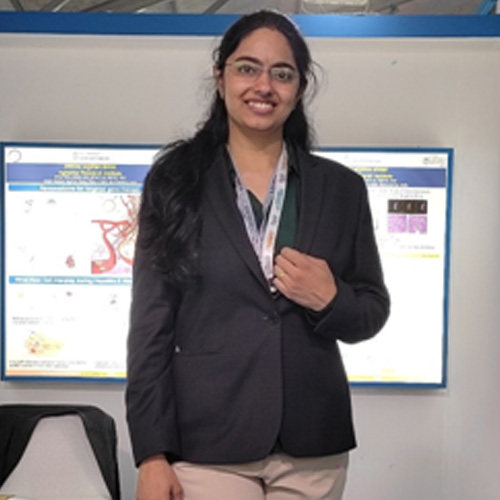
Name : Vaidehi Shripad Pisu
Designation : Project Assistant
Brief Background :
After completing my M.Sc. in Microbiology at Government Institute of Science, Aurangabad, and joined Agharkar Research Institute as a Ph.D. student. Registered for Ph.D. under Dr. Prashant K. Dhakephalkar Sir and working on anaerobic gut microorganisms exploring their probiotic potential for improved health. Currently, while pursuing the Ph.D., working as a project assistant on an HTBSIL-sponsored project.
Contact Details :
Educational Qualification
- Qualified GATE- Life Sciences (2024)
- Qualified Maharashtra SET Examination (2020)
- M.Sc. Microbiology, from Government Institute of Science, with 1st position (89.9%, First Class with Distinction) in Dr. Babasaheb Ambedkar Marathwada University in M.Sc Microbiology in 2019-2020.
- B.Sc. Microbiology, (85.51%, First Division) with Late RangraoLohagaonkar Deshpande Prize for securing highest marks in Microbiolgy in Dr. Babasaheb Ambedkar Marathwada University inthe year 2017-18
Research Interests
- Authentication and Evaluation of Medicinal Plants, Pharmacognosy of Ayurvedic plants, Pharmacognostic specification of Crude drugs, Angiosperms Taxonomy
(Botany),Chromatographic techniques like HPTLC and TLC, Molecular Systematics
Publications / Patents / Varieties
My research interest is in
- Animal Tissue culture: Cell line handling
- Animal Studies: Mice model
- 3D-Bioprinting
- Whole genome sequencing and bioinformatic analysis
- Exploring the probiotic potential of various anaerobic microorganisms
- Evaluating the adhesion potential of the probiotic organism on the human intestine derived cell lines using different microscopic techniques
- Genomic analysis of the organisms

Name : Aditya Eklare
Designation : PhD Student
Brief Background :
I completed my Bachelor’s degree in B.Sc Biotechnology from Modern College, Ganeshkhind, Pune, which is affiliated to Savitribai Phule Pune University. Following that, I pursued my Master’s degree from the same institution, Modern College, Ganeshkhind, Pune. I am currently enrolled in a doctoral program, working towards my PhD under the mentorship of Dr. Sumit Singh Dagar.
Contact Details :
Educational Qualification
-
-
Research Interests
My research interest is involved around investigating the enzymes synthesized by anaerobic fungi that play a role in breaking down lignocellulosic biomass. I aim to explore the characteristics and functions of these enzymes to enhance our understanding of biomass degradation processes for sustainable applications.
Publications / Patents / Varieties
-
-
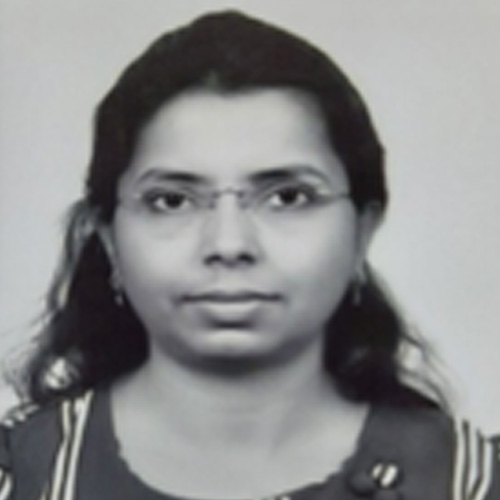
Name : Dr. Durgadevi Aphale
Designation : Project Scientist-IIII
Brief Background :
I do have 13 years of Industrial research experience in various research areas including strain development for sustainable fuels, cloning and over-expression, fermentation, animal probiotics, bacteriocins, protein characterization and purification, waste- water treatment, rumen microbiology and molecular biology, bioinformatics, Omics analysis, High Throughput Screening Liquid Handling System, Polyhydroxyalkanoates, Biosurfactant: Human Anti-Cancer Activities. I have handled the industrial microbial culture collection for more than 7 years, providing proprietary microbial cultures to the domestic and International customers with strong adherence to the guidelines, certifications, and documentation. Currently associated with Agharkar Research Institute and working on development of technology for biofuels production from lignocellulosic feedstocks.
Contact Details :
Educational Qualification
- PhD in Microbiology (Dec 2020) – Industrial PhD sponsored by Praj Industries Limited, Pune, India In collaboration with Symbiosis International Deemed University, Pune, India.
- Thesis: “In-vitro characterization of Probiotic and OR Pathogen Induced Variation In the Microbial Community of Rumen”
- MSc in Microbiology (2008-2010) – Yashwantrao Chavan College of Science Karad, Shivaji University, Kolhapur | Graduated with 77.7%. University Ranker.
- Dissertation Project: “Development of Microbial Enzymes for degradation of Calcium Oxalate Kidney Stones”.
- BSc in Microbiology (2006-2008) – Yashwantrao Chavan College of Science Karad, Shivaji University, Kolhapur | Graduated with 78.8%. University Ranker.
Research Interests
Research areas of Interest
- Biofuel production from lignocellulosic feedstocks
- Industrial strain development with site directed mutagenesis and advanced molecular biology tools and techniques
- Rumen anaerobic microbiology and molecular biology
- High Throughput Liquid Handling System
- Biosurfactant and Bioplastics
- Bioinformatics
- Animal probiotics
Current research area
A novel process development for scale up of biofuel production from lignocellulosic feedstocks
Publications / Patents / Varieties
- 1. A New Record of Endemic and Endangered Mycorrhizal Plant: Ceropegia media (Huber) Ansari from India; IOSR Journal of Environmental Science, Toxicology and Food Technology (IOSR-JESTFT) e-ISSN: 2319-2402, p- ISSN: 2319-2399.Volume 10, Issue 5 Ver. I (May. 2016), PP 79-85.
- 2. A New Record of Endemic and Critically Endangered Mycorrhizal Plant: Ceropegia rollae (Hemadri) from India; International Journal of Current Microbiology and Applied Sciences, ISSN: 2319-7706 Volume 5 Number 6 (2016) pp. 190-203.
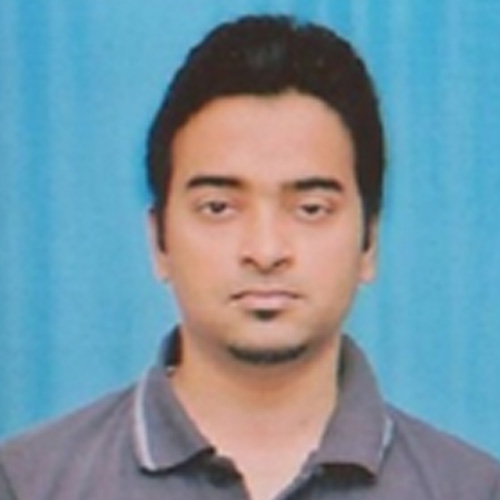
Name : Dr. Param Jeet Saroj
Designation : Senior Project Associate
Brief Background :
Dedicated biotechnology researcher with expertise in thermophilic fungi, lignocellulosic biomass degradation, and enzyme production. I hold a Ph.D. in Biotechnology from the National Institute of Technology Warangal and have postdoctoral experience at the Swedish University of Agricultural Sciences. My work focuses on sustainable biotechnological innovations.
Contact Details :
Educational Qualification
- B.E. (Biotechnology), Dr. B.R. Ambedkar University, Agra, 75.96%, Division: First, August 2010
- M.Tech (Biotechnology), Sam Higginbottom Institute of Agriculture Technology and Sciences, Prayagraj, 8.68 CGPA, September 2014
Research Interests
- Isolation and screening of thermophilic fungi for hydrolytic enzyme production
- Co-cultivation techniques for enhanced lignocellulosic biomass degradation
- Application of biotechnology in sustainable biofuel production and industrial enzyme processes
Publications / Patents / Varieties
- Saroj, p., p., m. &narasimhulu, k. 2024. Enhanced reducing sugar production by blending hydrolytic enzymes from aspergillus fumigatus to improve sugarcane bagasse hydrolysis. Environmental science and pollution research. Https://doi.org/10.1007/s11356-024-34246-1, if 5.8
- Saroj, p., p., m. &narasimhulu, k. 2023. Morphology, physicochemical, and metabolite characterization of aspergillus fumigatus mycelium. Biomass conv. Bioref.. Https://doi.org/10.1007/s13399-023-04271-0, if 4.8
- Eilertsen, l., hultberg, m., lee, n., saroj, p., swaine, m., chen, f., &xiong, s. (2023). The microbial community in a substrate of solid-state fermentation by lentinula edodes: a preliminary study. Fermentation, 9(8), 736. Https://doi.org/10.3390/fermentation9080736, if 3.8
- Saroj, p., p, m. &narasimhulu, k., 2022. Biochemical characterization of thermostable carboxymethyl cellulase and ?- glucosidase from aspergillus fumigatus jcm 10253. Applied biochemistry and biotechnology, pp.1-25. Https://doi.org/10.1007/s12010-022-03839-2., if2.5
- Saroj, p., manasa, p. And narasimhulu, k., 2021. Assessment and evaluation of cellulase production using ragi (eleusine coracana) husk as a substrate from thermoacidophilic aspergillus fumigatus jcm 10253. Bioprocess and biosystems engineering, 44(1), pp.113-126. Https://doi.org/10.1007/s00449-020-02428-z, if 2.5

Name : Mr. Prasad Ade
Designation : Project Associate – 1
Job Description :
I am a Project Associate at Agharkar Research Institute, Pune, under Dr. Sumit Singh Dagar. I hold a Master’s in Biophysics from BAMU Aurangabad, where I ranked first. My research focuses on anaerobic fungal diversity in the gut microbiomes of herbivores using culturomics and metagenomics. I have qualified in MH SET, GATE Biotechnology, and Life Sciences and previously worked on seed-specific transcription factors at NABI, Mohali.
Contact Details :
ResearchGate: https://www.researchgate.net/profile/Satish-Maurya-2?ev=hdr_xprf
Educational Qualification
- MSc Biophysics 1st Rank (Government Institute of Science,Sambhajinagar) 2022
- BSc. Biotechnology (SRTM University Nanded) 2020
- GATE-BT (2024), GATE-LS (2024), MH-SET (2024), and GAT-B qualified
Research Interests
My research focuses on exploring anaerobic fungal diversity in the gut microbiomes of herbivorous ruminants and non-ruminants using culturomics and metagenomics.
I aim to understand the dynamics of these microbial ecosystems and gain deeper insights into digestive microbiomes. Previously, as a research trainee at NABI, Mohali, I worked on the ‘Molecular and Functional Analysis of Seed-specific DOF Transcription Factor,’ enhancing my expertise in molecular biology and functional genomics.
Publications / Patents / Varieties
Ade, P., Kumari, P., & Salvi, P. Implication of integrated multi-omics approaches to decode the molecular basis of drought stress response in plants: An Omics’s perspective. Current Omics Advancement in Plant Abiotic Stress Biology. (https://doi.org/10.1016/B978-0-443-21625-1.00003-8) 2024

Name : Mr. Pruthviraj Dhaygude
Designation : Project Assistant
Brief Background :
I am a biotechnologist with expertise in anaerobic microbiology. My research has focused on the isolation of methanogens and bacteriophages targeting methanogens. Currently, I am working on biohydrogen production, exploring sustainable and efficient methods for renewable energy generation. My work combines a deep understanding of microbial ecology with innovative approaches to harnessing microbial processes for environmental and energy solutions.
Contact Details :
Educational Qualification
- B.sc Biotechnology 2022 Rajarshi Shahu Mahavidyalaya, Latur (Autonomous) (CGPA:7.70)
- M.sc Biotechnology 2024 Rajarshi Shahu Mahavidyalaya, Latur (Autonomous) (CGPA:7.72)
Research Interests
My current research focuses on Isolation of mesophilic Hydrogen producing anaerobic bacteria and optimization of it to produce sustainable energy solutions and advancing our understanding of mesophiles in energy production.
Publications / Patents / Varieties

Name: Shahabaz Valmik Pinjari
Designation: Project Assistant
Brief Background :
I am currently working on production of biofuels majorly focusing on biohydrogen and bioethanol generation using anaerobic microorganisms and diverse lignocellulosic biomass types, including agricultural residues aiming towards waste valorisation. My work emphasizes optimizing microbial fermentation processes to maximize yield while addressing challenges related to biomass recalcitrance. I actively chemical and biological pretreatment strategies that enhance cellulose and hemicellulose accessibility.
Contact Details :
Educational Qualification
- Master’s in Biotechnology (MIT-World Peace University, Pune),
- Bachelor’s in Biotechnology (DY. Patil International University, Akurdi, Pune)
Research Interests
- Agricultural waste valorisation
- Biohydrogen and Bioethanol production
- Process scale-up
Publications / Patents / Varieties

Name: Nimesha Fernandes
Designation: Project Assistant
Brief Background :
I am a microbiologist with expertise in medical microbiology, molecular biology, and environmental biology. My professional experience includes roles as a Food Safety Supervisor in the UAE and a Quality Control Officer at Molbio Diagnostics. I have conducted diverse research projects, including characterizing cold-tolerant Arctic bacteria, studying nicotine-degrading microorganisms, and exploring eco-friendly mosquito larvicidal agents using soil bacteria and plant extracts.
Contact Details :
Educational Qualification
- MSc Microbiology | June 2018 – October 2020 (St Xavier’s College (Autonomous), Mumbai, India)
- BSc Microbiology | July 2015 – April 2018 (Govt College of Arts, Science & Commerce Khandola, Goa, India)
Research Interests
- My current research focuses on isolating psychrophilic organisms with the potential to produce hydrogen, contributing to sustainable energy solutions and advancing our understanding of extremophiles in energy production.
Publications / Patents / Varieties

Name: Ms. Roshani Mishra
Designation: Senior Research Fellow
Brief Background :
Dedicated researcher specializing in microbiology, with expertise in molecular techniques, microbial ecology, and bioinformatics. My work focuses on metagenomics, microbial-induced corrosion (MIC), and bioremediation. I am proficient in DNA sequencing, protein purification, and the analysis of complex microbial communities using advanced bioinformatics tools. I have strong scientific communication skills, backed by experience in academic writing and collaborative projects.
Contact Details :
Educational Qualification
- PhD in Microbiology (2024 – Present) – Agharkar Research Institute, Pune (SPPU). Thesis: “Phage-Mediated Control of Sulfate-Reducing Bacteria in Oil Reservoirs: Mechanisms and Strategies”
- MSc in Microbiology (2018 – 2020) – Institute of Science, Nirma University, Ahmedabad | Graduated with 80.7%. Dissertation Project: Microbial Fuel Cell treatment for bio-electricity generation from industrial wastewater.
- BSc in Microbiology (2015 – 2018) – M.G. Science College, Ahmedabad | SGPA: 7.85. Research Project: Agro-waste degradation for crude biofertilizer production.
Research Interests
Environmental Microbiology and Bioremediation
- Microbial-Induced Corrosion (MIC) and Phage Therapy
- Bioinformatics and Next-Generation Sequencing (NGS)
- Plastic and Dye Degradation Using Microbial Consortia
- Enzyme Characterization for Industrial and Environmental Applications
Publications / Patents / Varieties
- “Cloning and characterization of FMN-dependent azoreductases from textile industry effluent identified through metagenomic sequencing” Journal of the Air & Waste Management Association, 2024.
- “Exploring genetic landscape of low-density polyethylene degradation for sustainable troubleshooting of plastic pollution at landfills” Science of Total Environment, 2024.

Name: Ms. Saily Harkal
Designation: Project Assistant
Brief Background :
After completing my Master’s dissertation on probiotic characterization, I joined Agharkar Research Institute as a Project Assistant. Currently, I am involved in the identification and characterization of both aerobic and anaerobic microorganisms that have the potential to be developed as next-generation probiotics. This research includes a comprehensive approach, incorporating both in vitro studies and in silico analyses
Contact Details :
Educational Qualification
- M. Sc. Microbiology, Modern College of Arts, Science and Commerce (Autonomous), Shivajinagar, Pune CGPA: 9.38
- B. Sc Microbiology, Dr. D. Y. Patil Arts, Commerce and Science College, Pimpri, Pune. Savitribai Phule Pune University, CGPA: 8.50
Research Interests
- Characterization of various probiotic strains including anaerobic microbes.
- In silico analysis of the organisms.
- Animal tissue culture related studies.
Publications / Patents / Varieties

Name: Sanyogita Berde
Designation: Project Assistant
Brief Background :
With a strong background in biotechnology, my research interest spans anaerobic microbiology, cavitation, water and wastewater treatment, along with juice processing for microbial load reduction. I have received recognition for my research, including the Best Paper Award at TISD 2023, and have a proven ability to adapt to fast-paced, multidisciplinary environments with a focus on sustainability and innovation.
Contact Details :
Educational Qualification
- M.Sc Biotechnology (2021 – 2023) Dr. Vishwanath Karad MIT World Peace University, Pune (CGPA – 9.56)
- B.Sc Biotechnology (2018 – 2021) St. Xavier’s College of Arts Science and Commerce, Goa (CGPA – 7.91)
Research Interests
My research focuses on bioenergy, specifically biohydrogen production from organic waste under psychrophilic, mesophilic, and thermophilic conditions. I am particularly interested in anaerobic microbiology, optimizing hydrogen yield through temperature variations, exploring microbial consortia, and advancing sustainable waste-to-energy technologies.
Publications / Patents / Varieties
- Berde, S. N., Dixit, D., Chapadgaonkar, S. S., & Bhandari, V. M. (2024). SWASTIIK Technology for Drinking Water Treatment- Enhancing Water Disinfection Efficacy using Fennel Oil and Hydrodynamic Cavitation. Journal of ISAS, 3(1), 62–82. doi: 10.59143/isas.jisas.3.1.KHHI2753

Name: Shweta Mangesh Bapat
Designation: Project Assistant
Brief Background :
I am currently working with anaerobic fungi, particularly in the areas of enzyme production and extraction. Experience includes managing the complexities of cultivating and studying these specialized microorganisms in controlled environments, where I have skills in optimizing conditions for enzyme synthesis applying this knowledge to advance biotechnological applications like biomethanation and bio ethanol production
Contact Details :
Educational Qualification
- BSc in Microbiology 2019, MES Abasaheb Garware College, Pune
- MSc in Microbiology 2021, Yahwantrao mohite college Bharati vidyapeeth
Research Interests
- Isolation and characterization of microorganisms
- Extraction and purification of lignocellulosic enzymes
Publications / Patents / Varieties
- Dr. Anuradha Jape, Shweta Bapat Book chapter publication COVID 19, traditional immune boosting drink ‘Kadha’ and pharmacovigilance perspective. In advance in Pharmaceutical and Biosciences Research; Thanuj International publishers, Tamil Nadu, India.

Name: Siddhi D. Chandras
Designation: Ph.D Student (Project Assistant)
Brief Background :
PhD candidate in Microbiology with research experience in industrial microbiology, food microbiology, and applied microbiology. Worked as Microbiologist and Laboratory Manager at National Accredited Laboratory as per ISO/IEC 17025. Currently working on the industry sponsored project which deals with the comprehensive probiotic characterization of aerobic and anaerobic putative probiotic cultures.
Contact Details :
Educational Qualification
- Qualified GATE XL 2022
- M.Sc. Microbiology, Fergusson College, Pune Savitribai Phule Pune University, Pune | CGPA: 8.98 | 2019
- B.Sc. Microbiology, ME Society’s Abasaheb Garware College, Pune Savitribai Phule Pune University, Pune | 74.63% | 2017
Research Interests
Evaluating the Potential Health Benefits and Probiotic attributes of Bacillus spp.: in vitroand in silico studies
- A comprehensive investigation into the probiotic potential of putative probiotic strains. By integrating extensive in vitro assessments with detailed genomic analysis, we illuminate the multifaceted capabilities and health benefits of the probiotic strains (Bacillus spp.) that can be considered promising probiotic candidates.
- Animal Tissue Culture studies.
Publications / Patents / Varieties
- Dhakephalkar, T., Pisu, V., Margale, P., Chandras, S., Shetty, D., Wagh, S., &Dhakephalkar, P. K. (2024). Strain-Dependent Adhesion Variations of Shouchellaclausii Isolated from Healthy Human Volunteers: A Study on Cell Surface Properties and Potential Probiotic Benefits. Microorganisms, 12(9), 1771.Strain-Dependent Adhesion Variations of Shouchellaclausii Isolated from Healthy Human Volunteers:A Study on Cell Surface Properties and Potential Probiotic Benefits.


